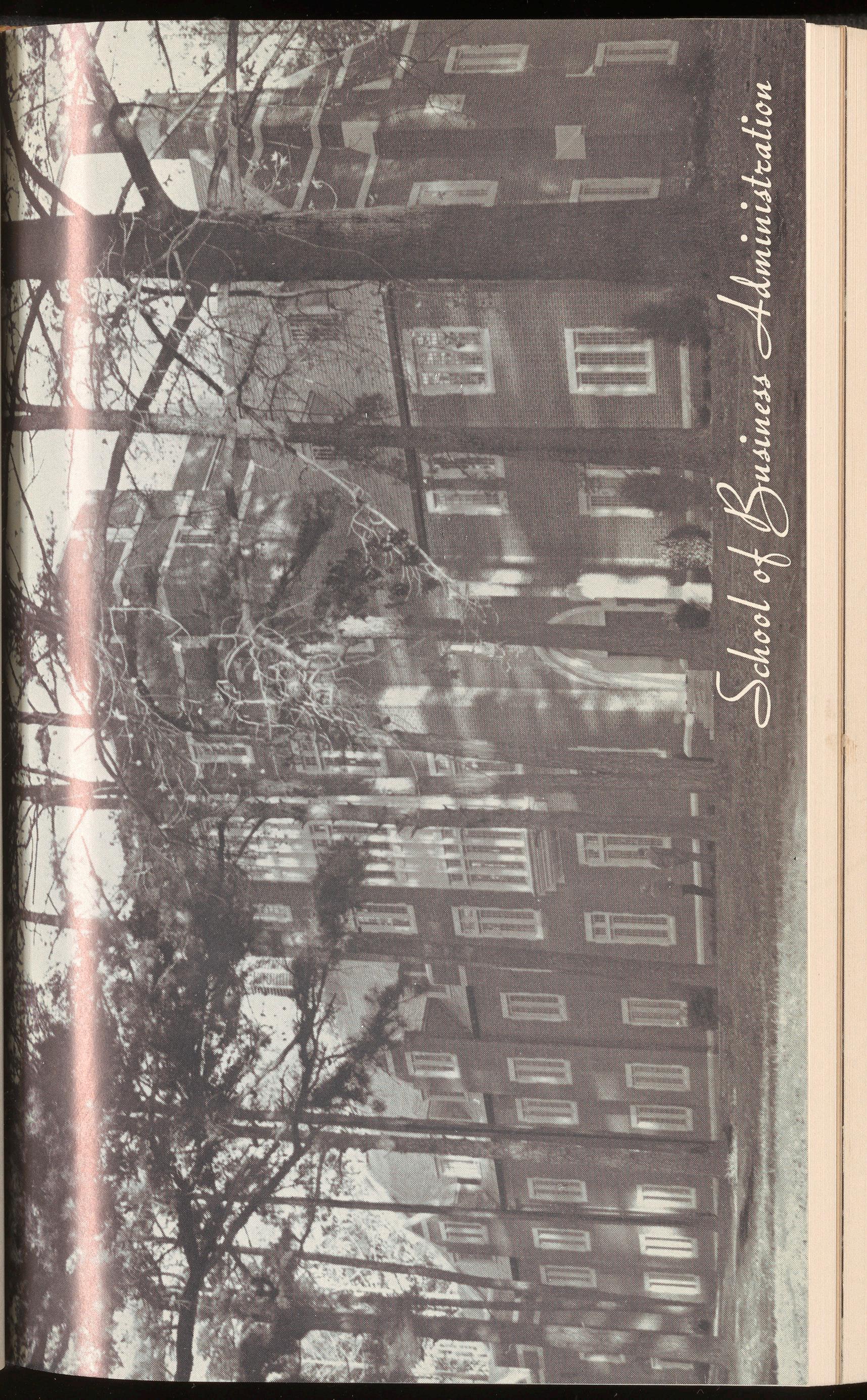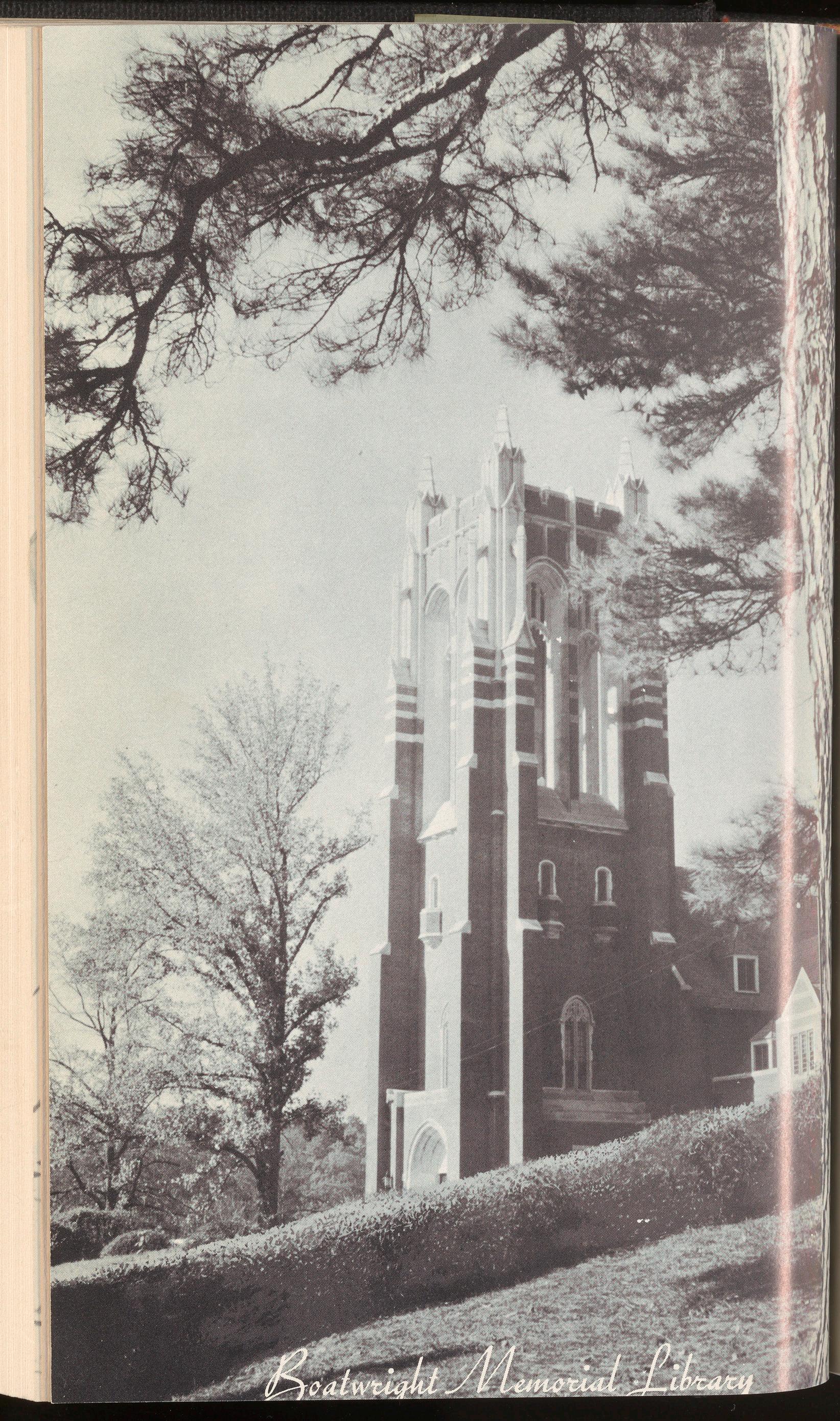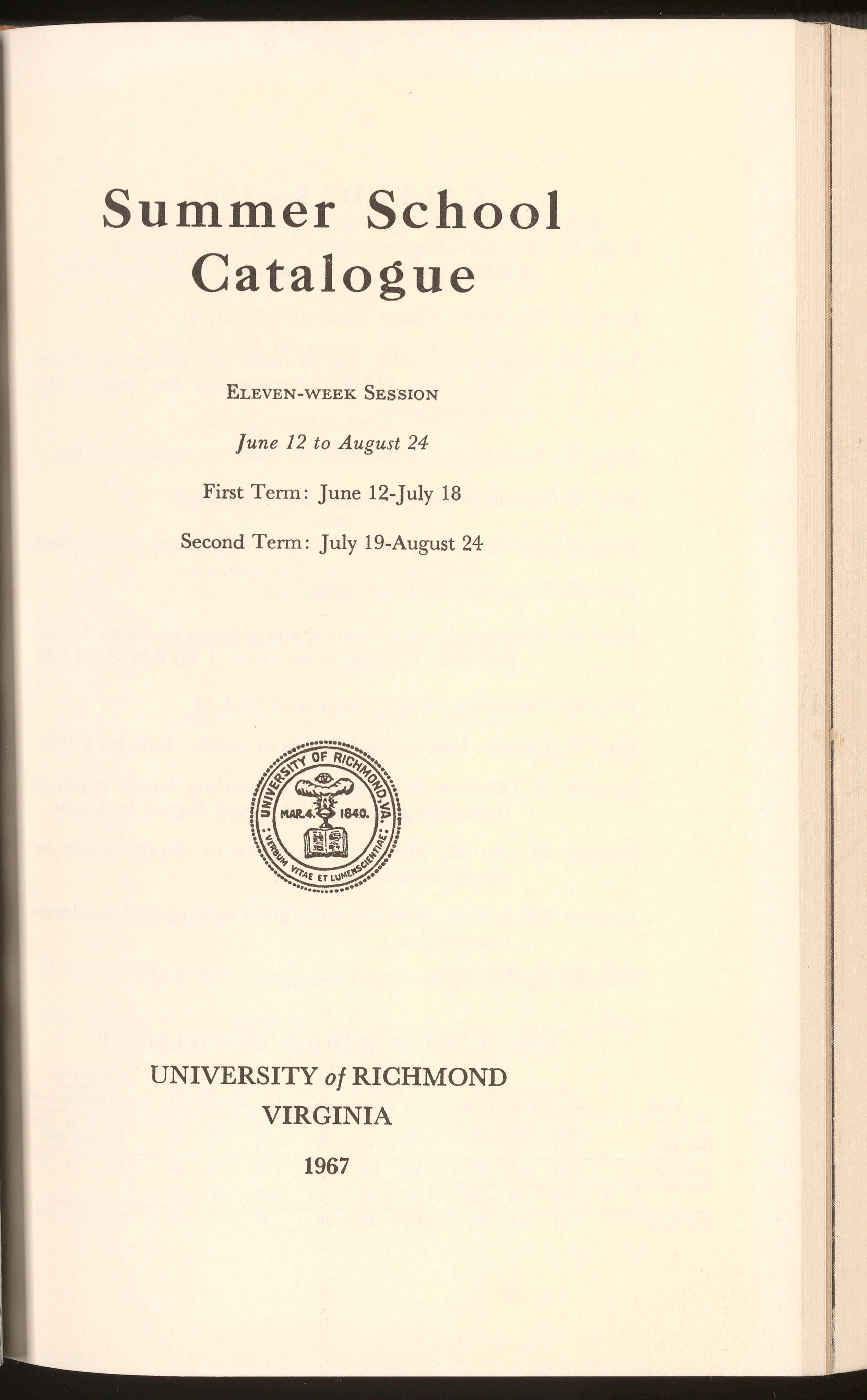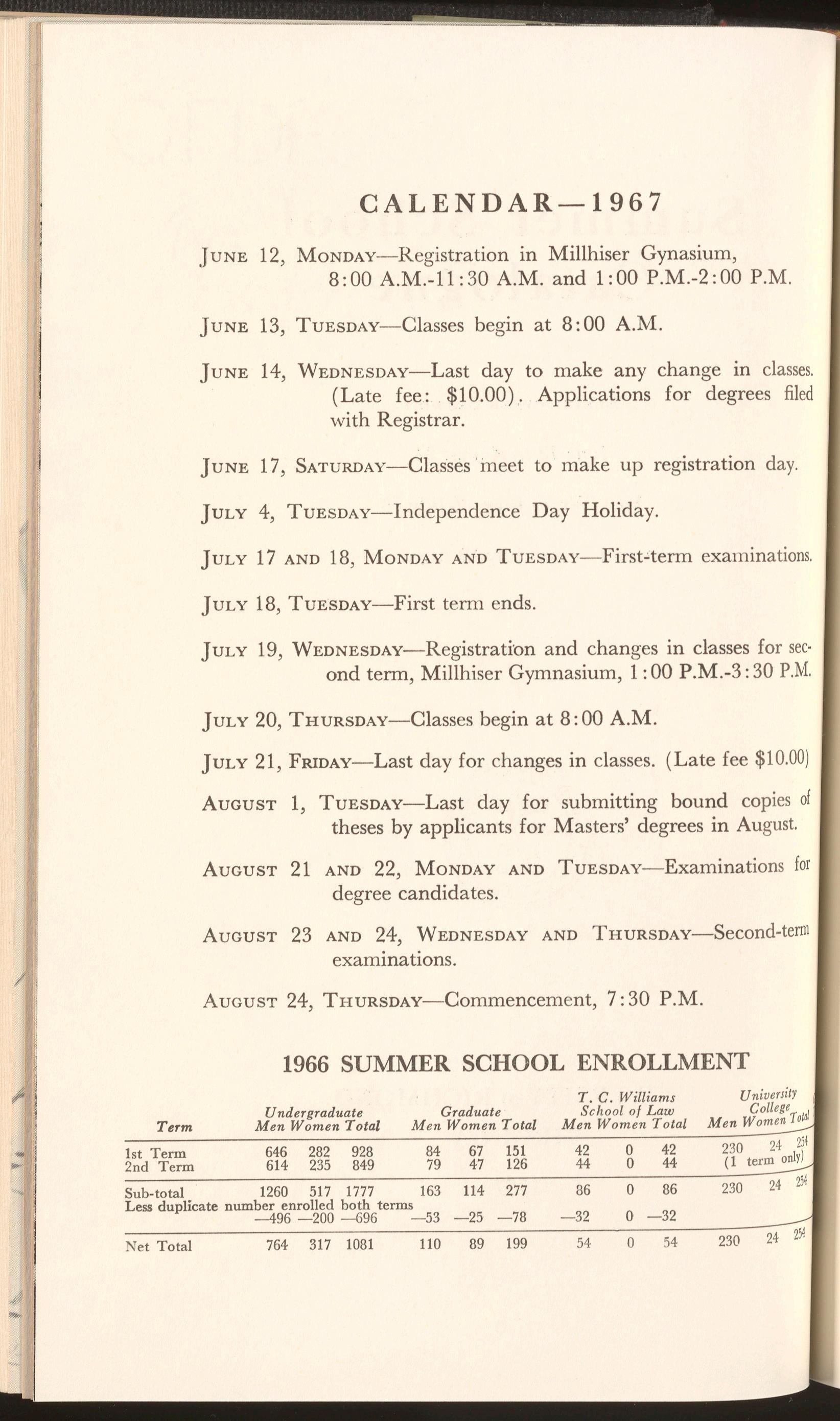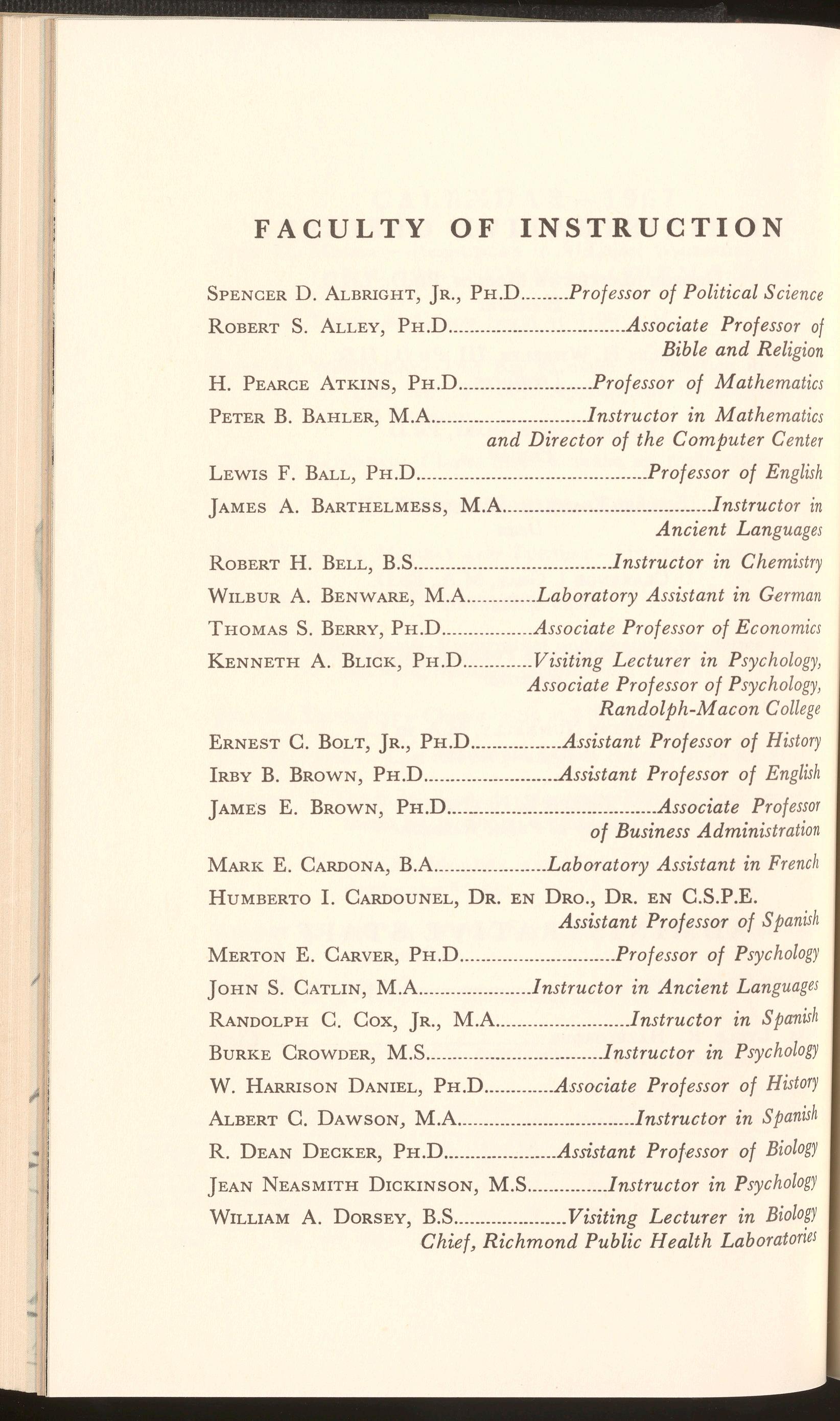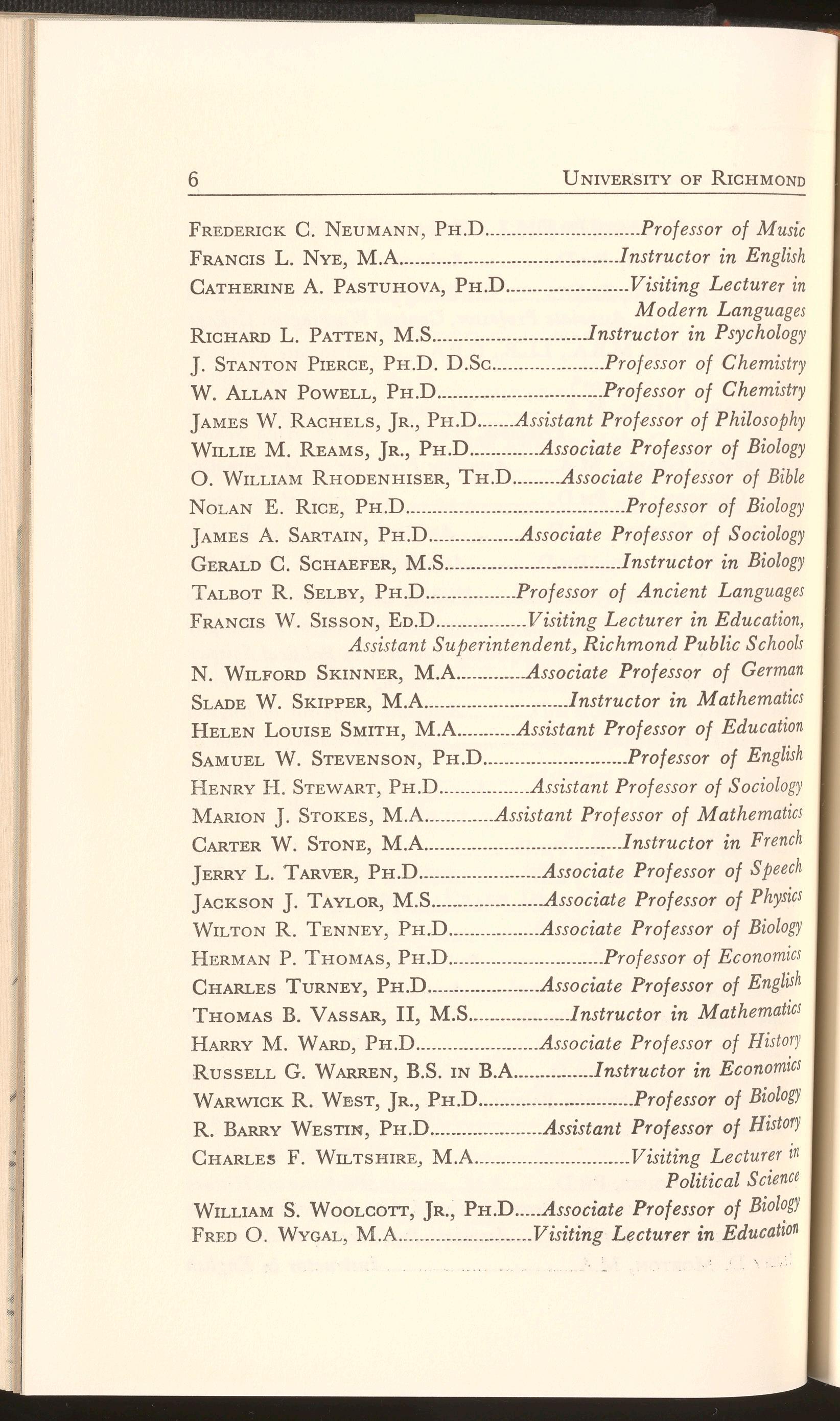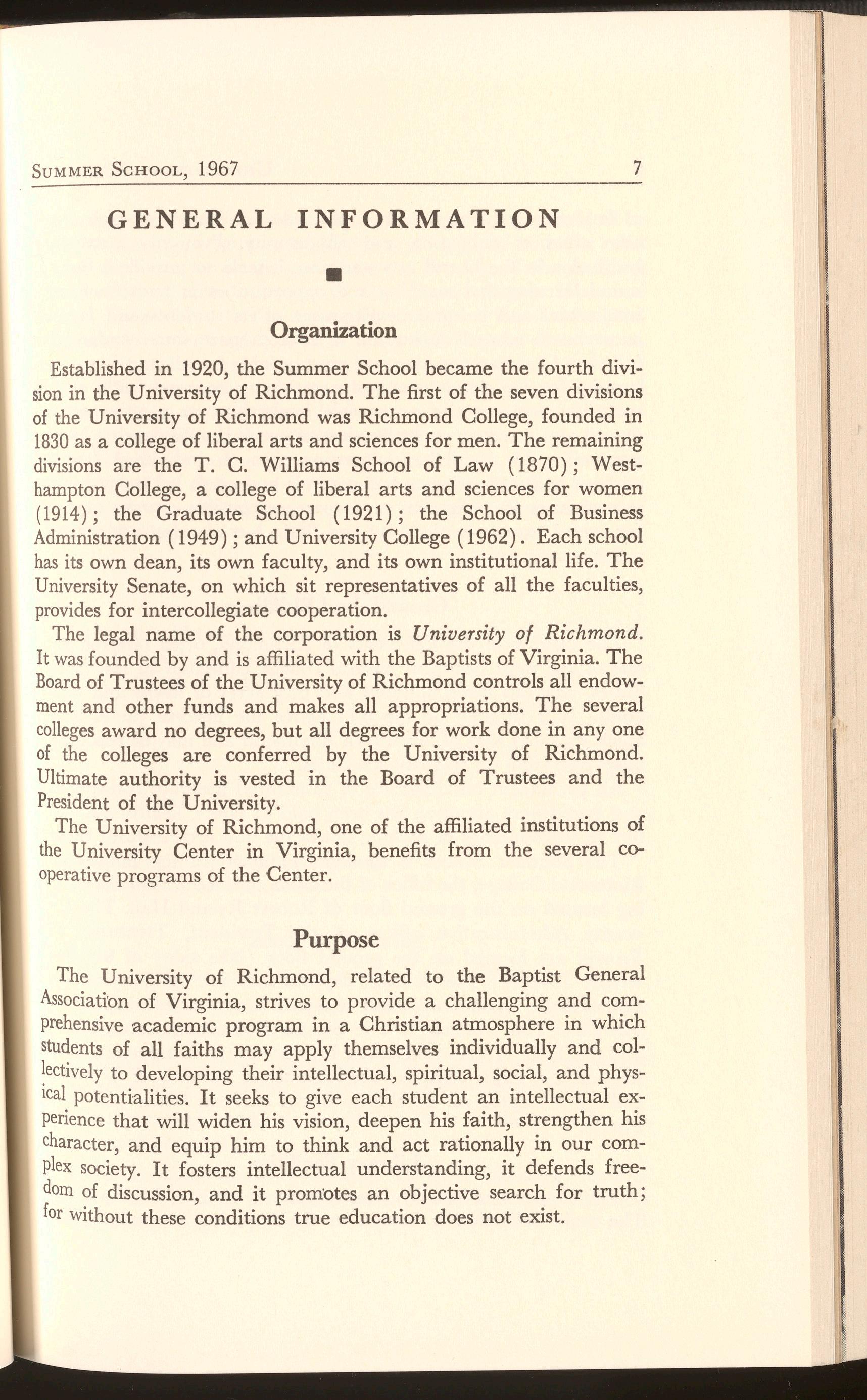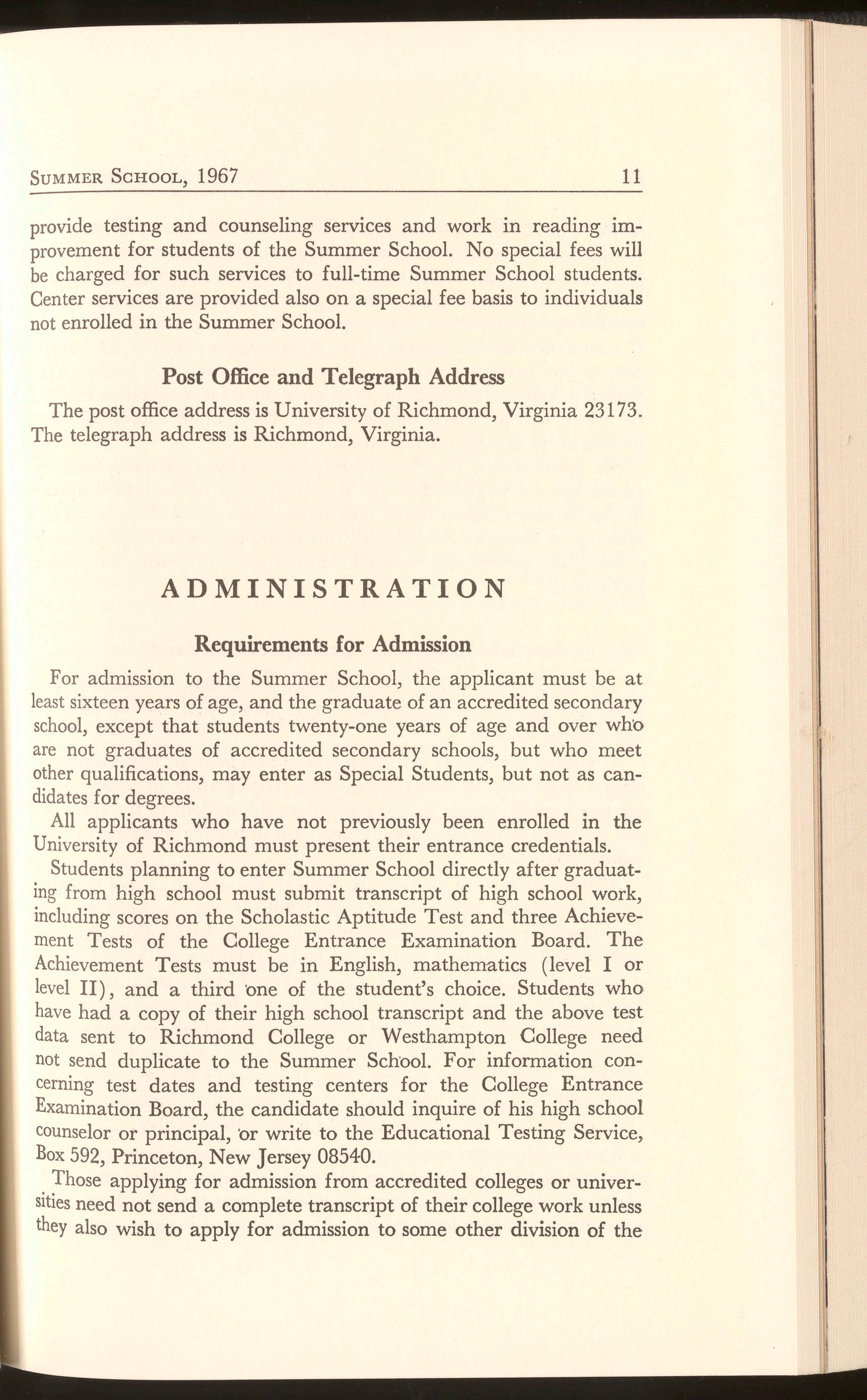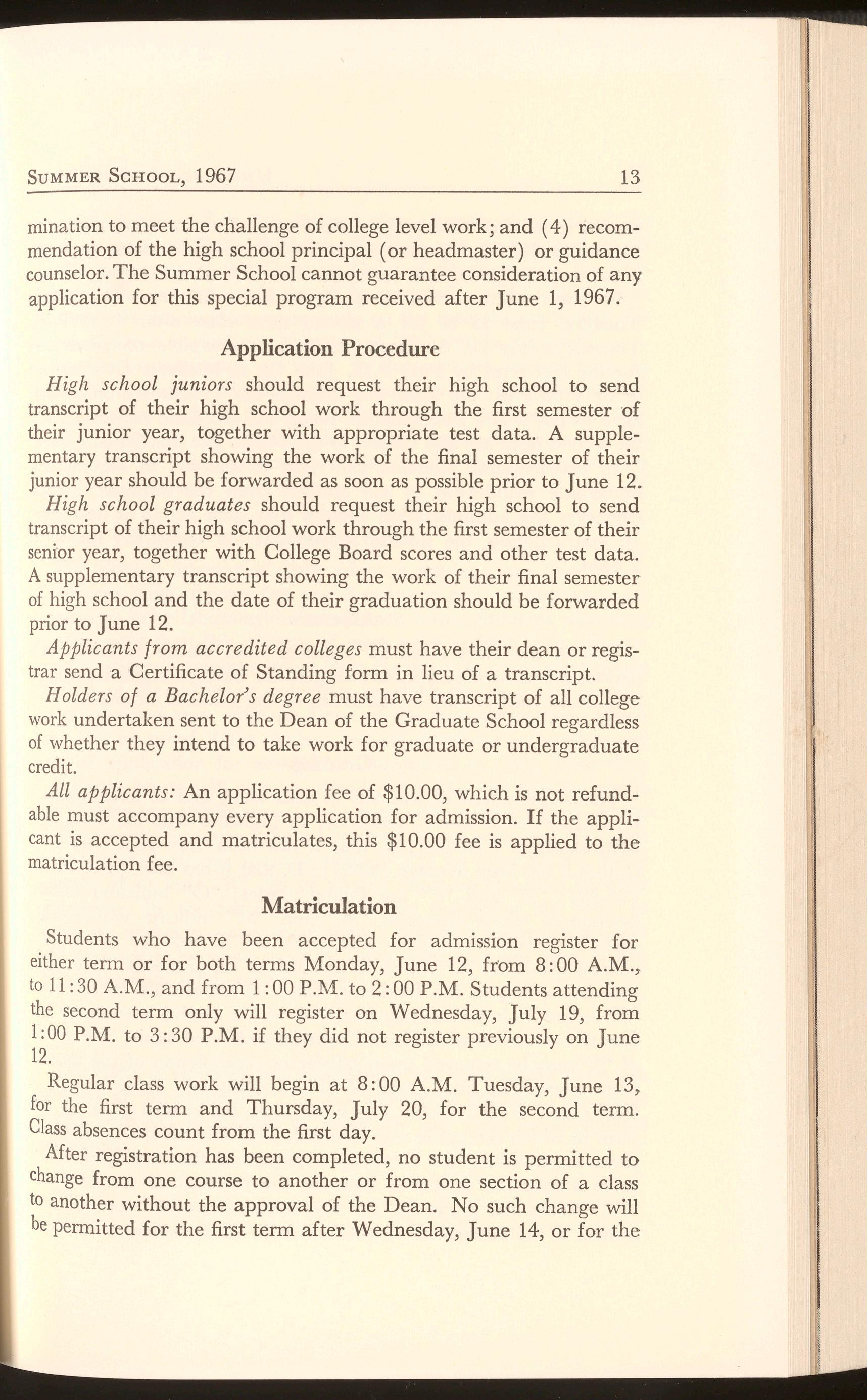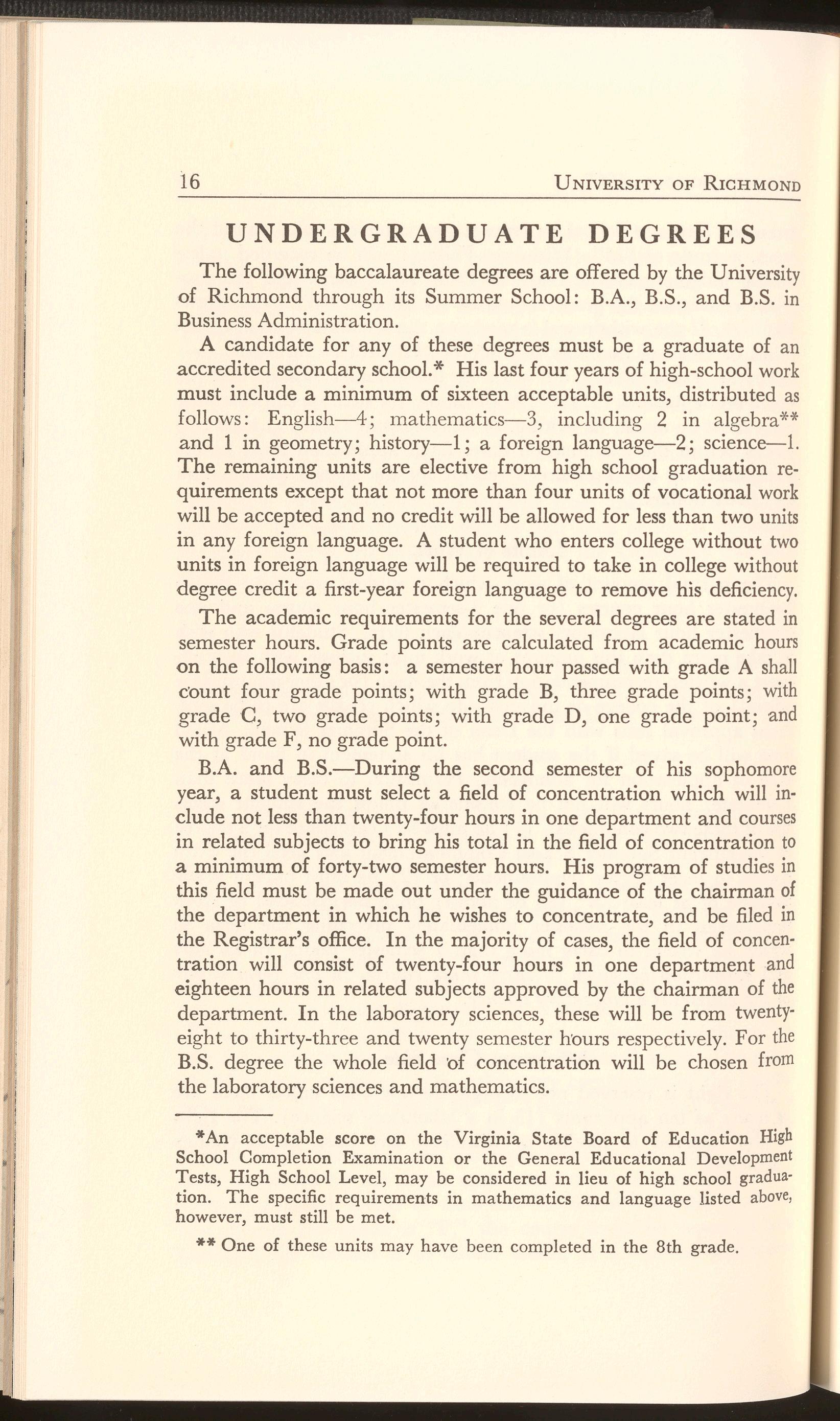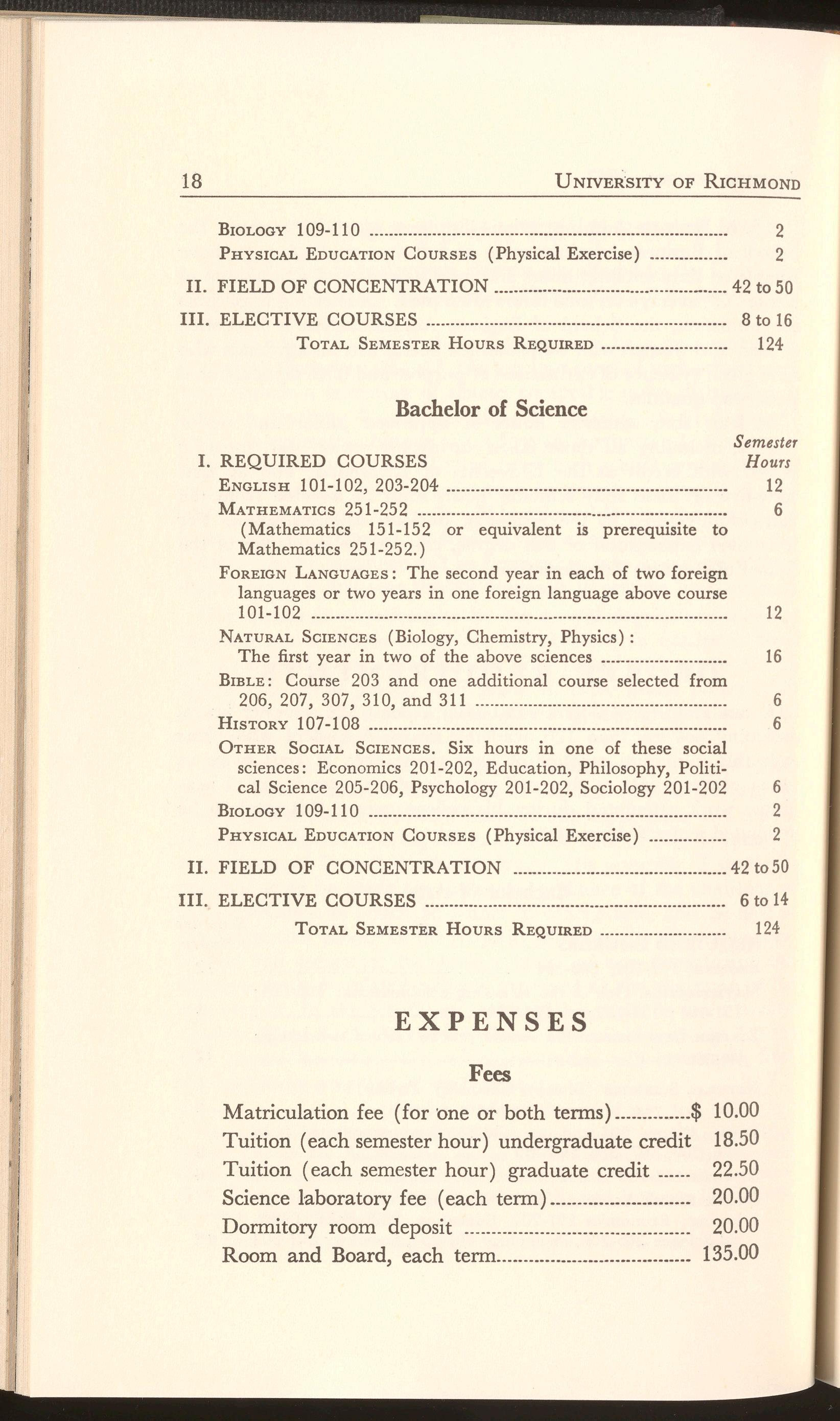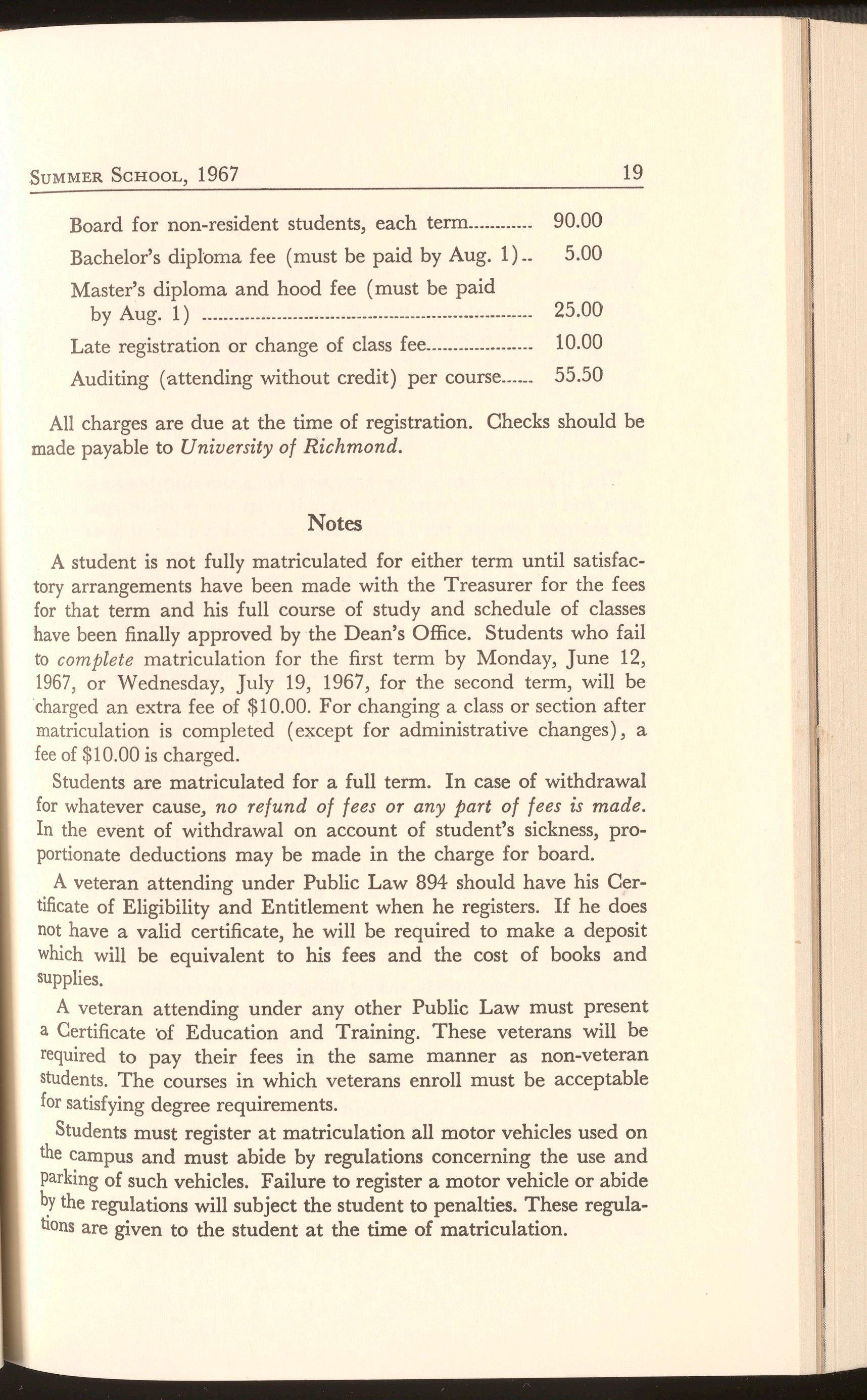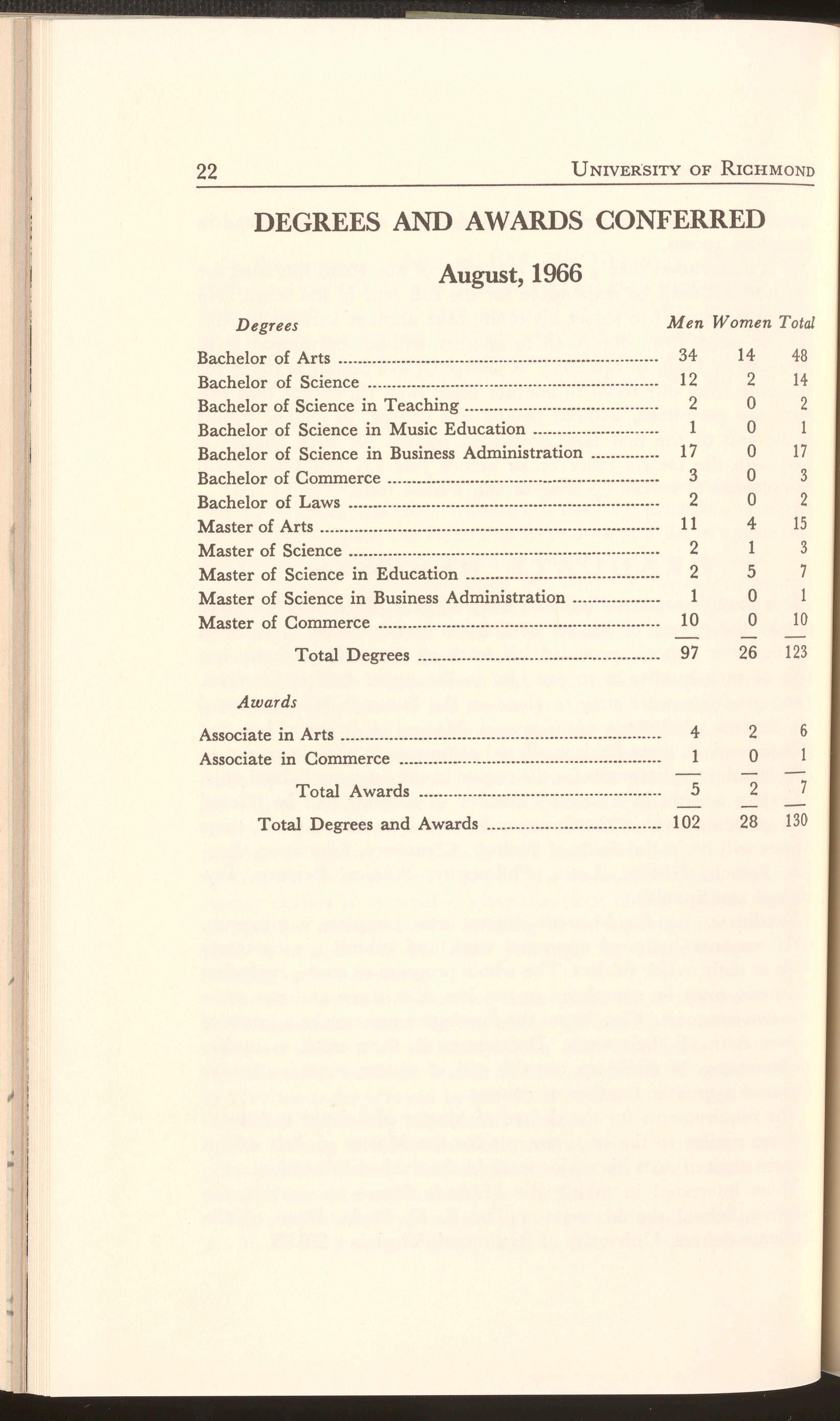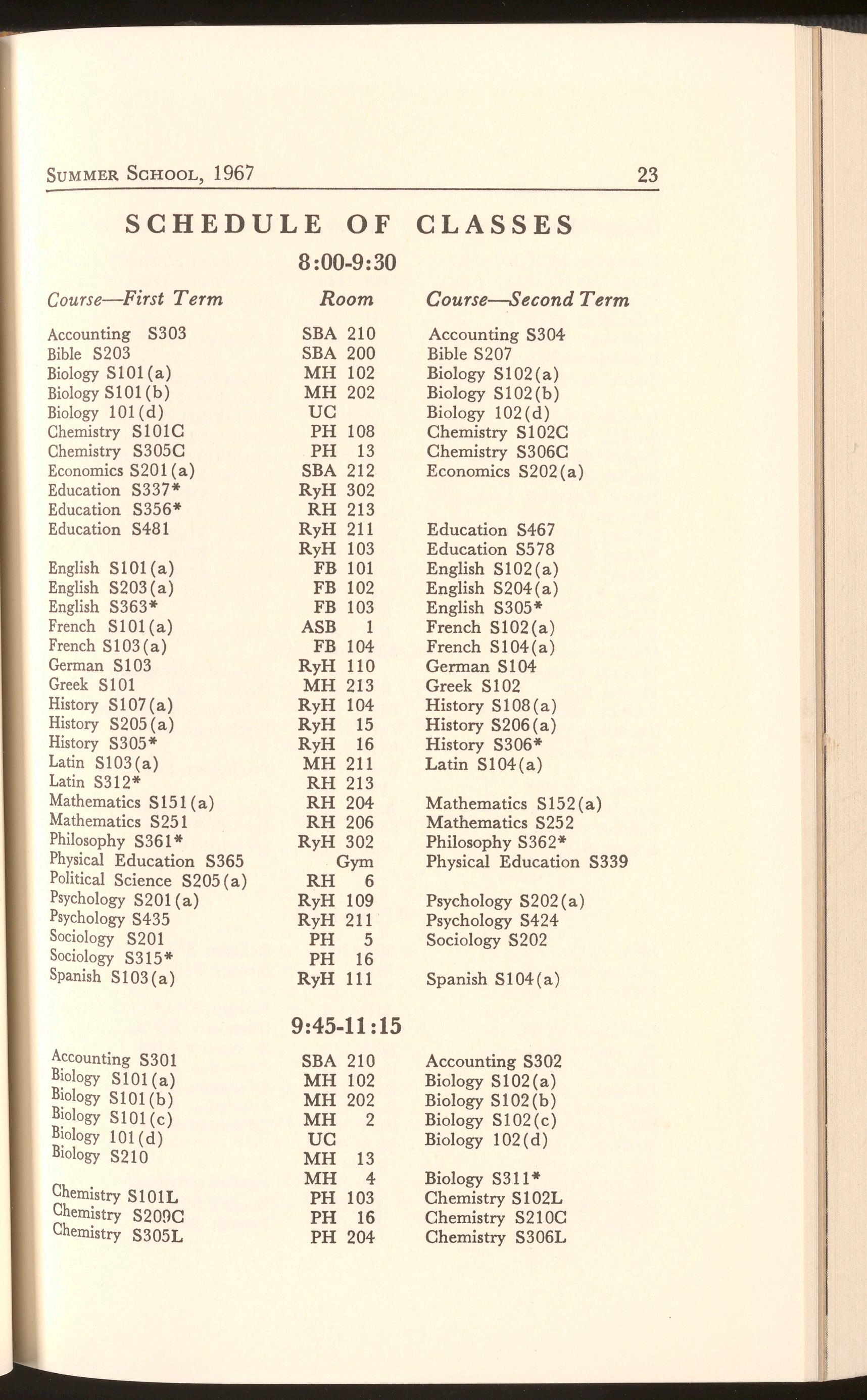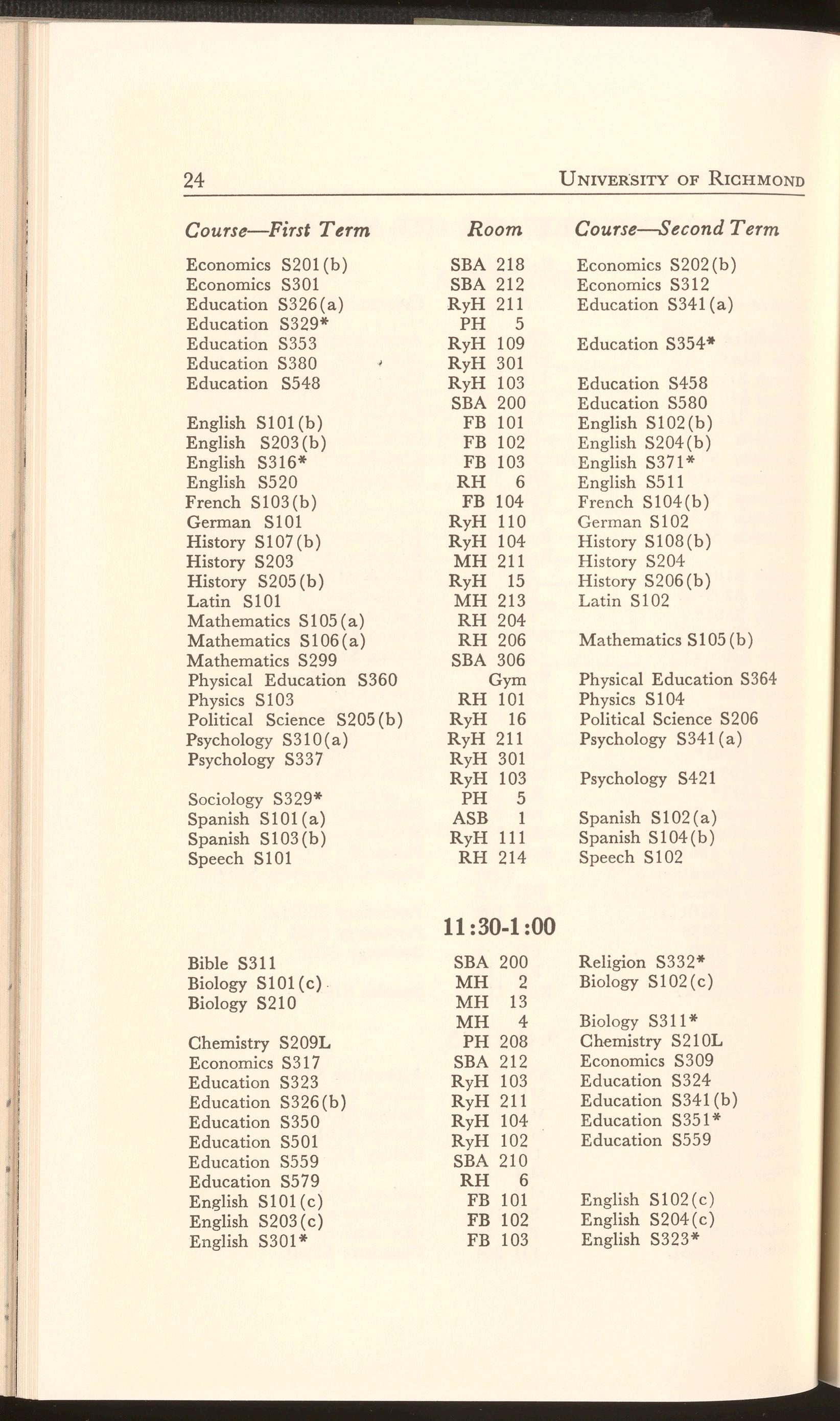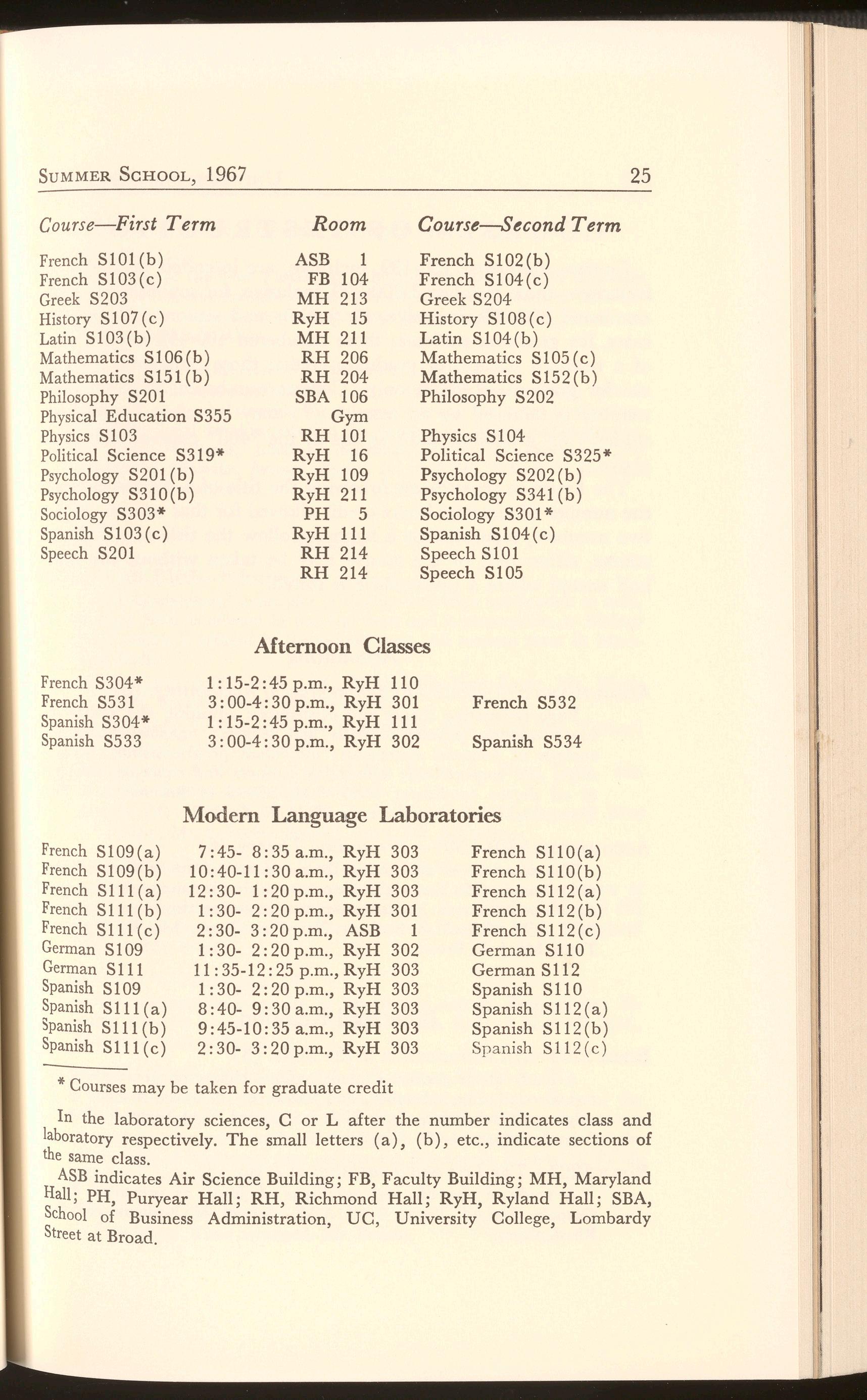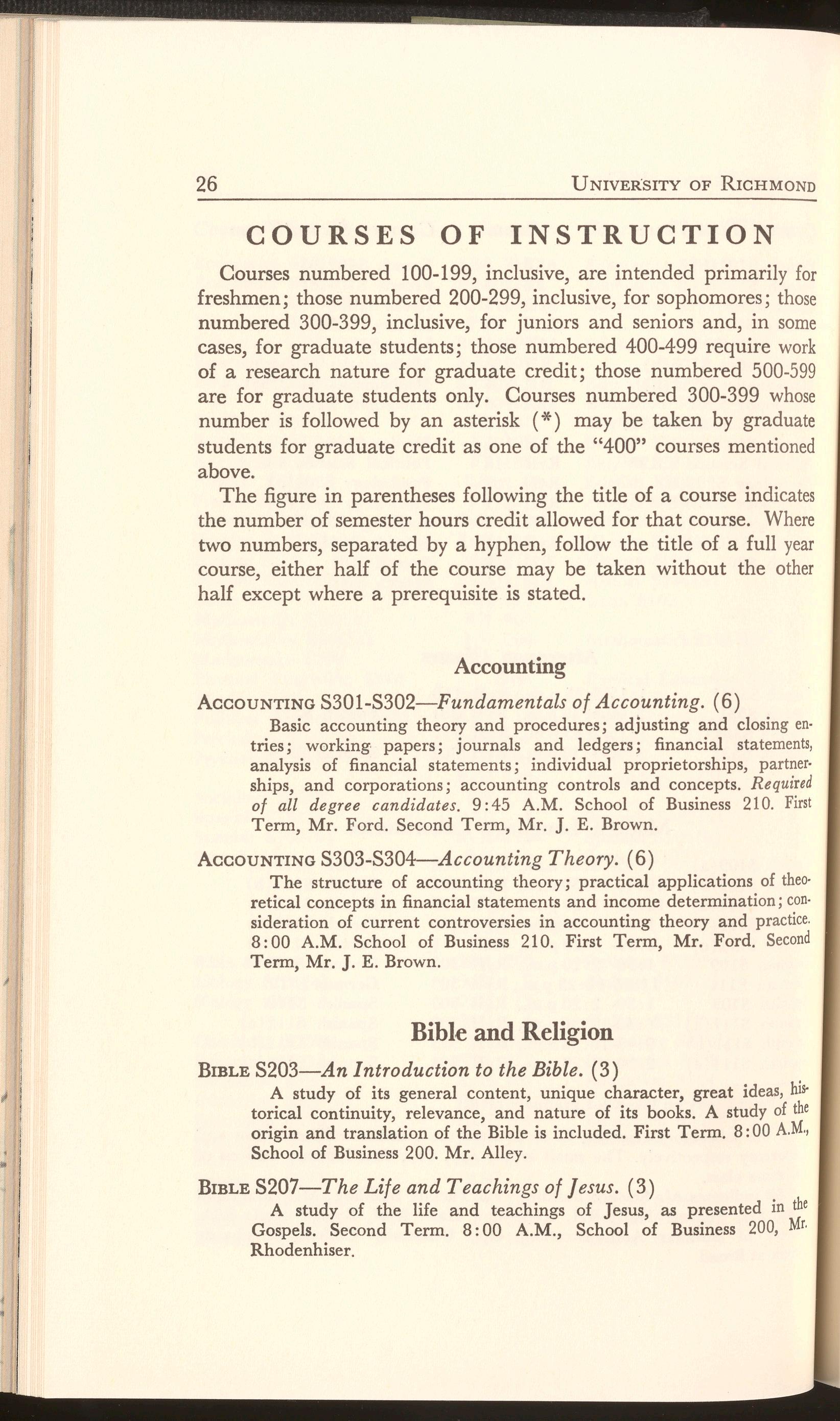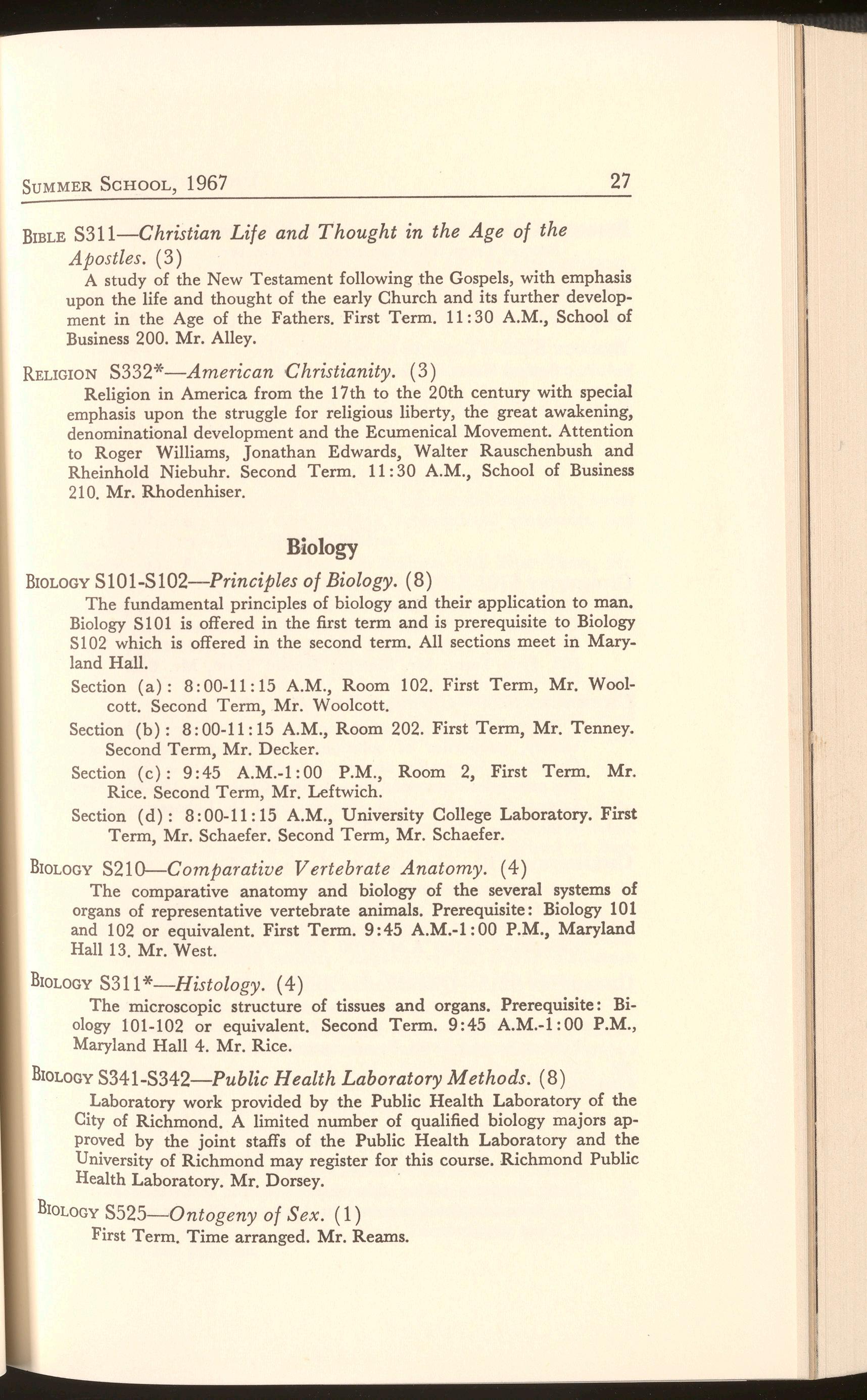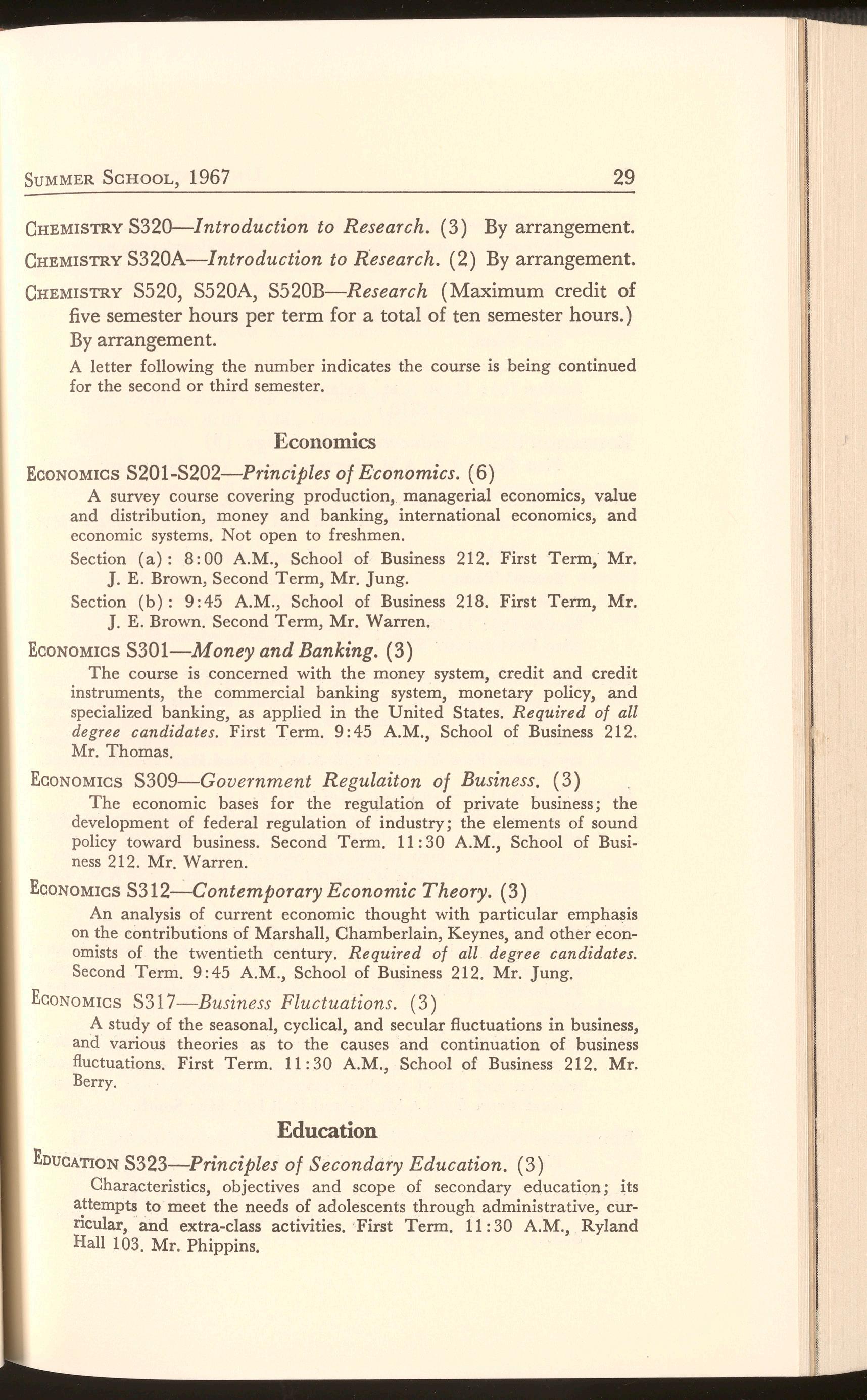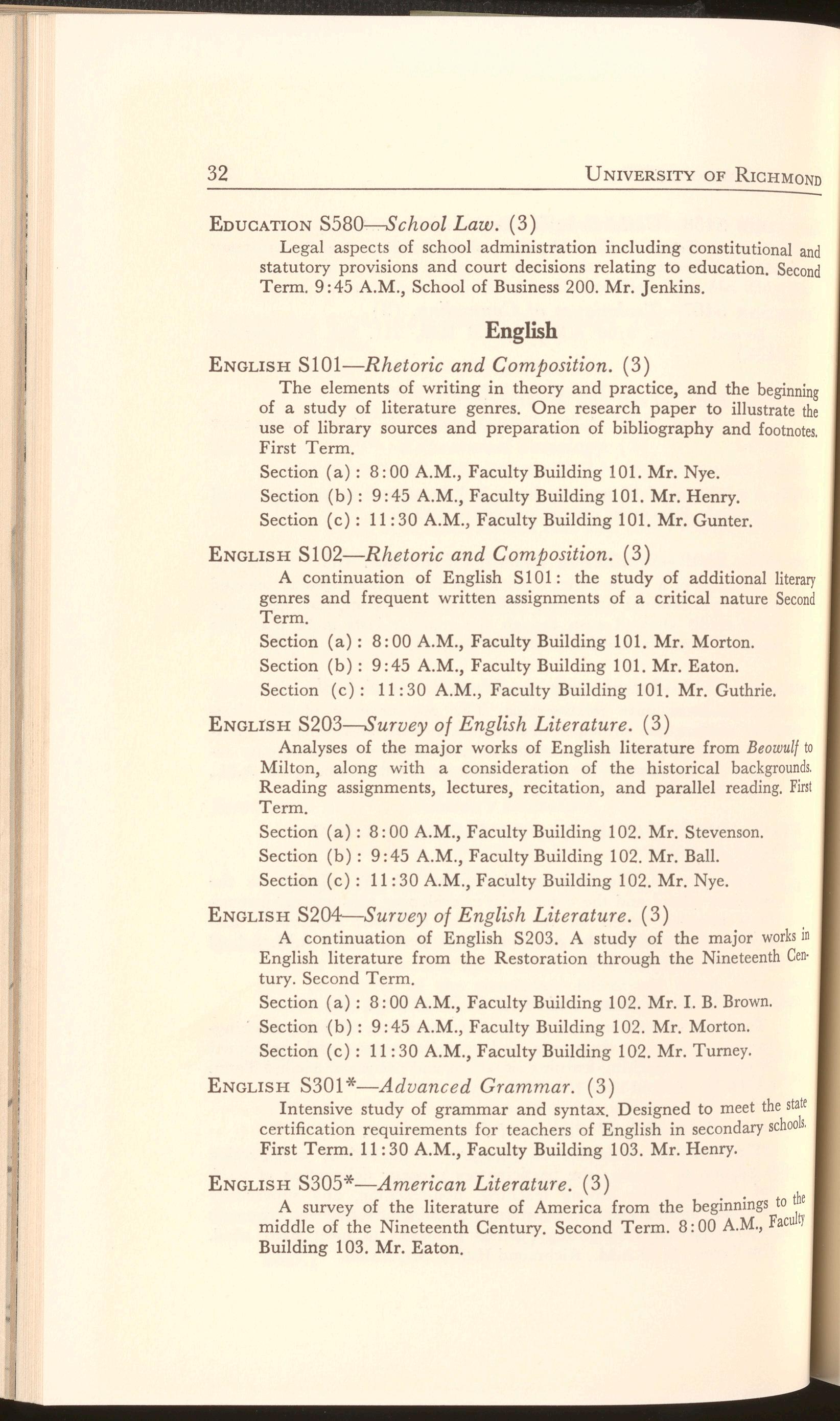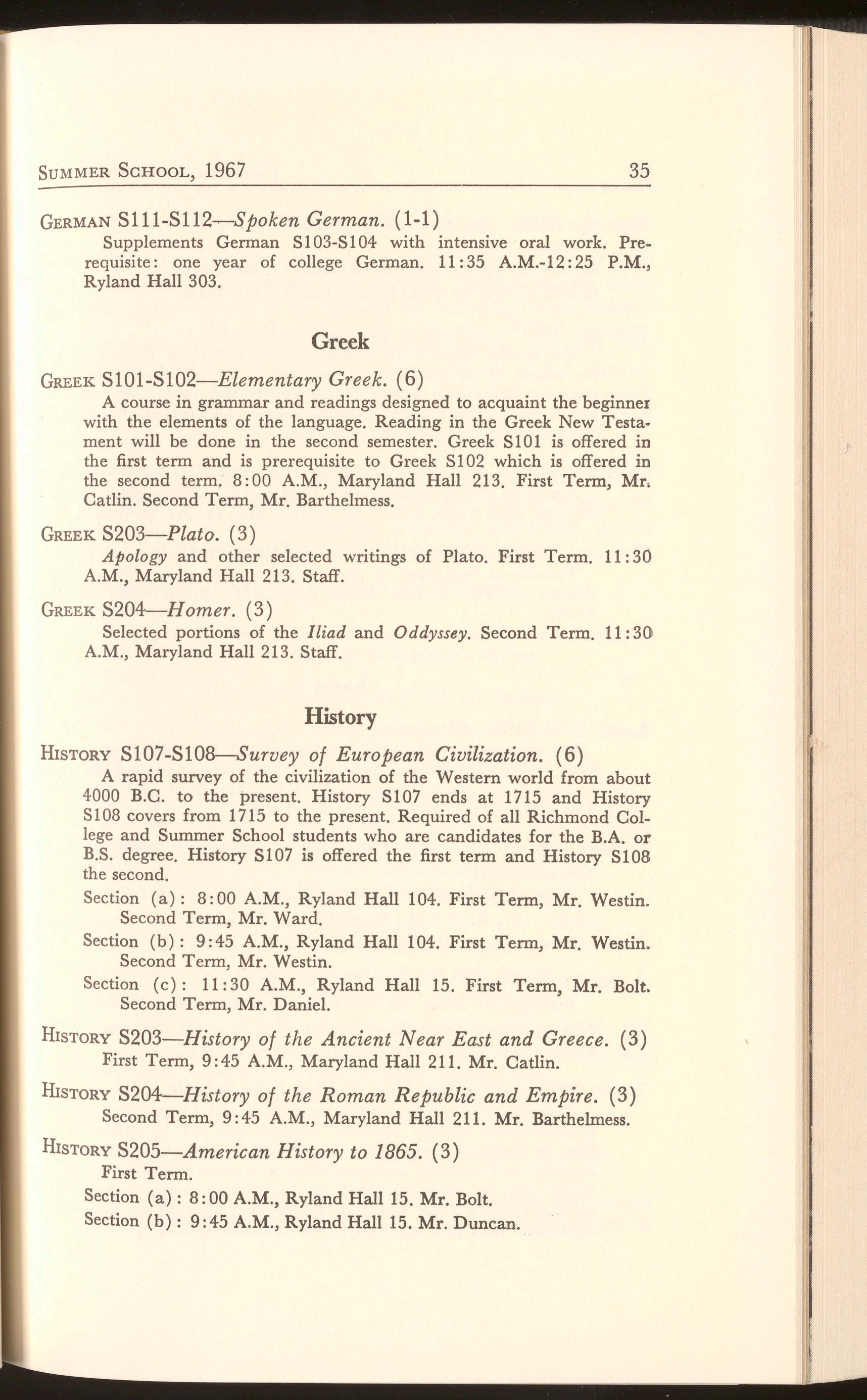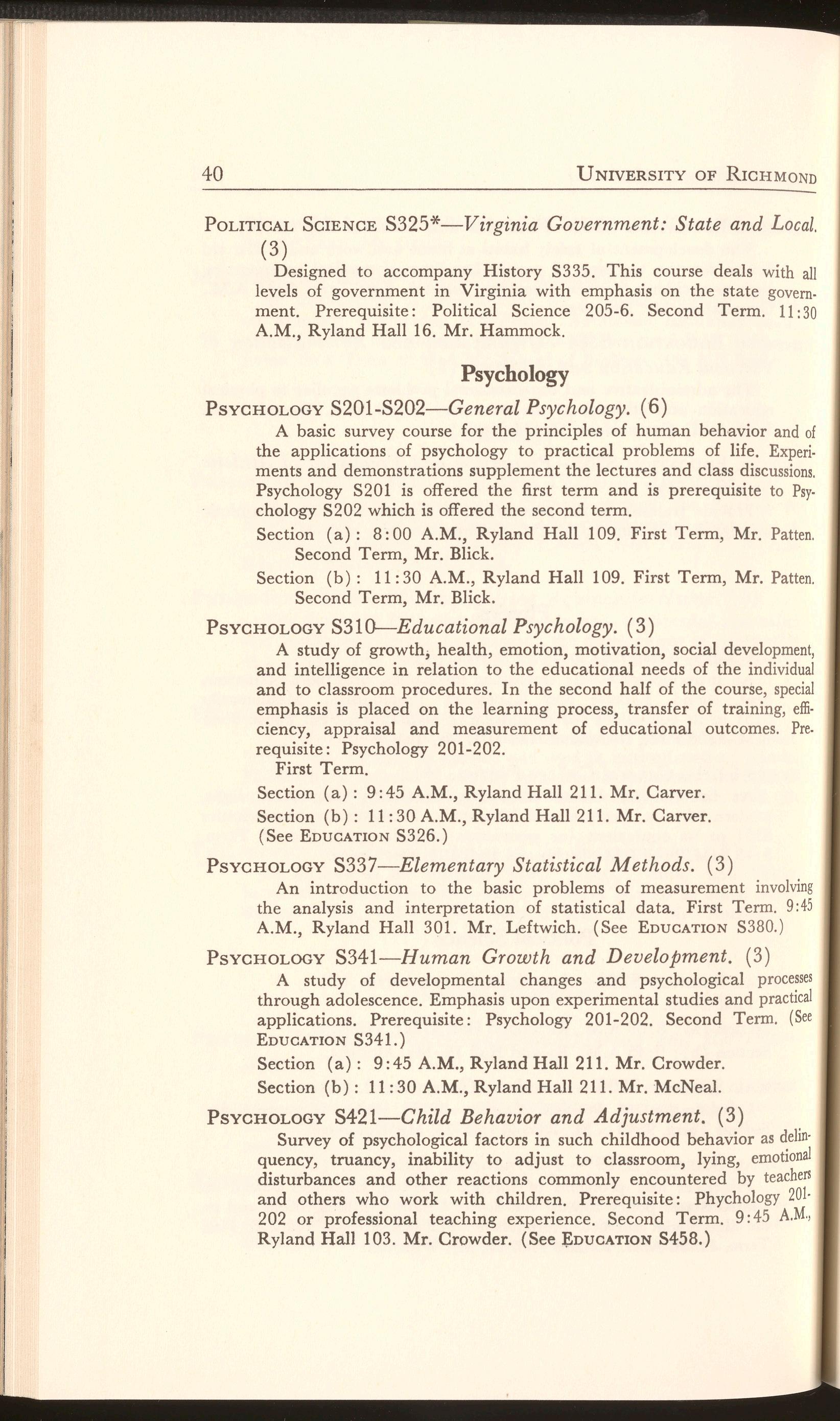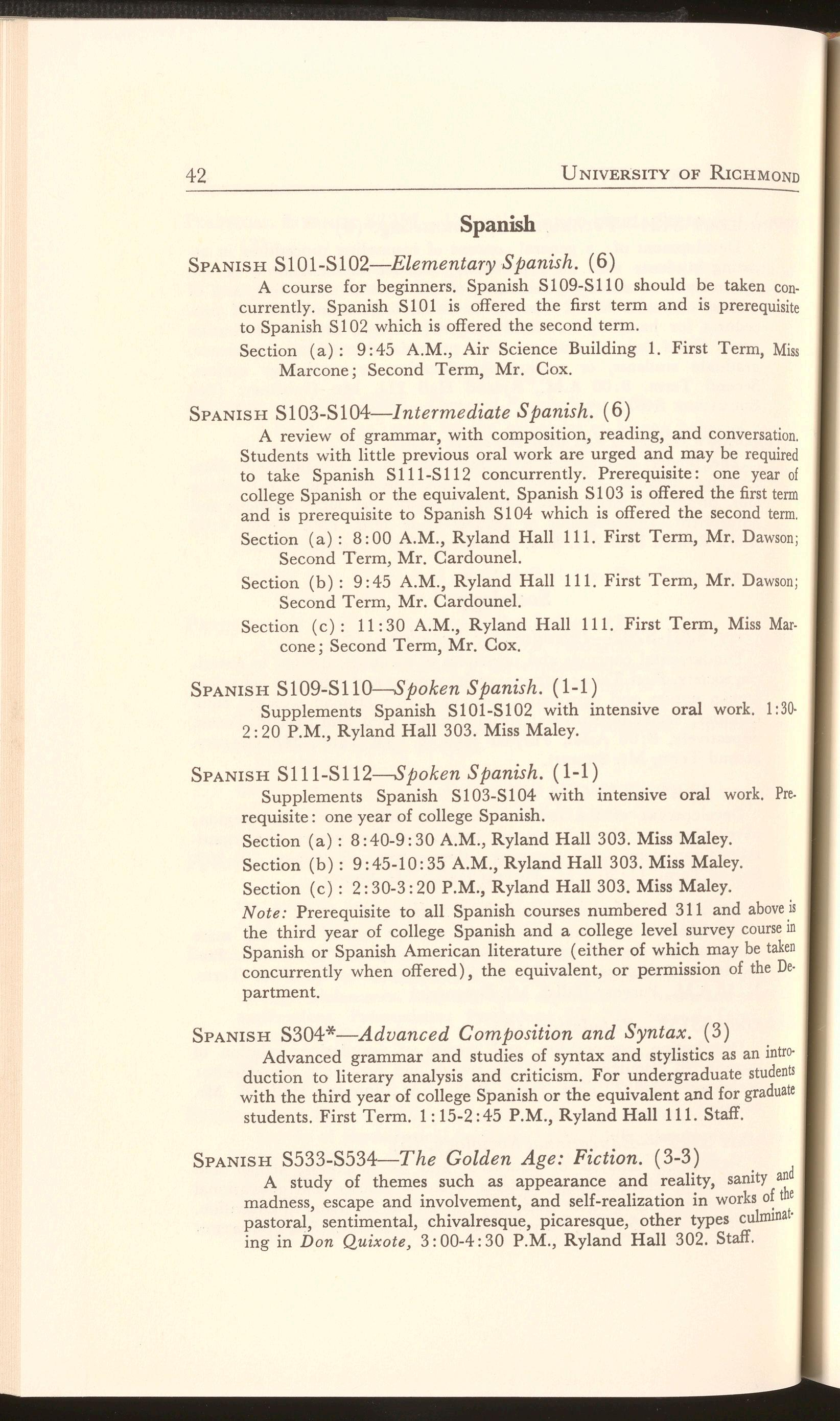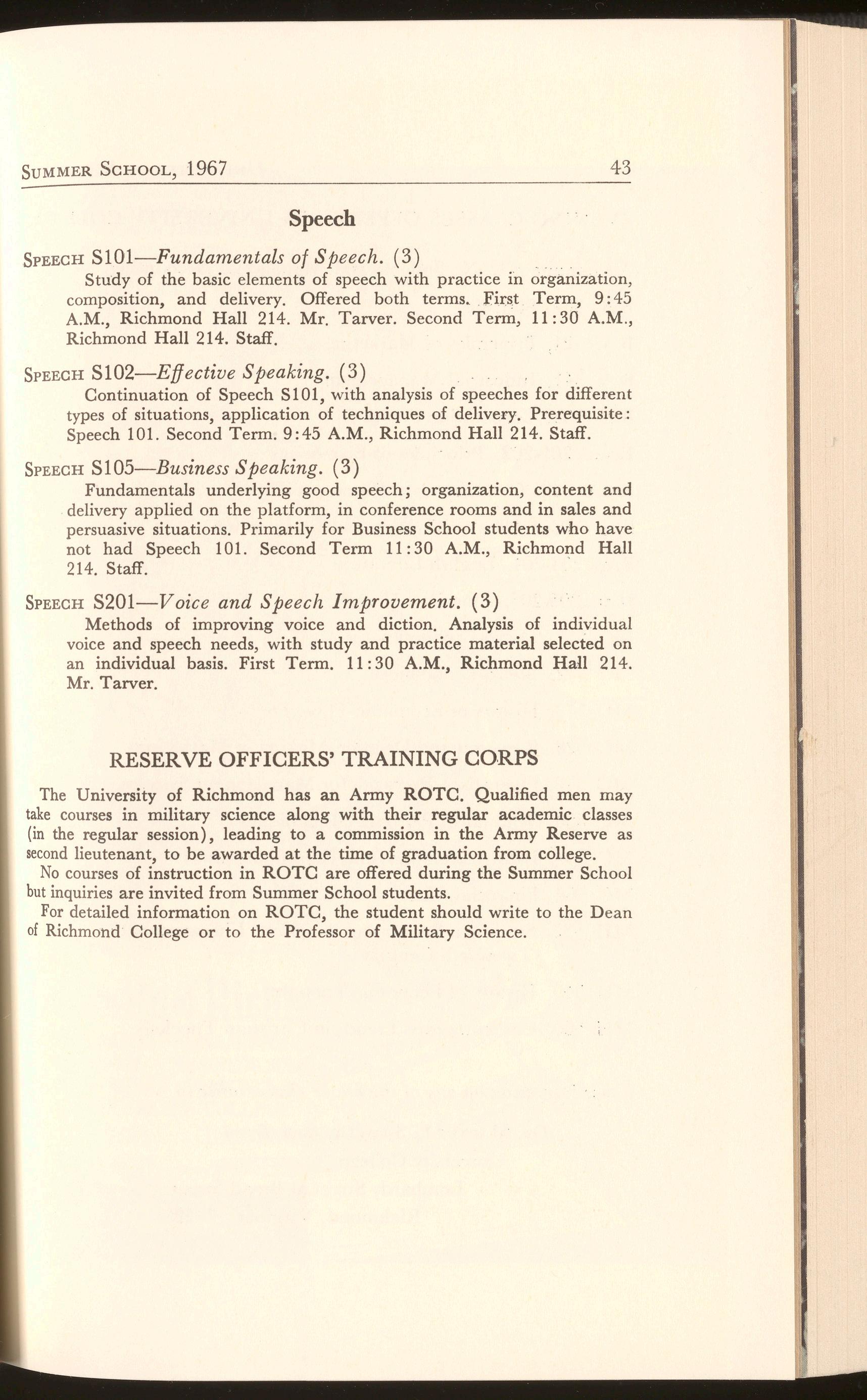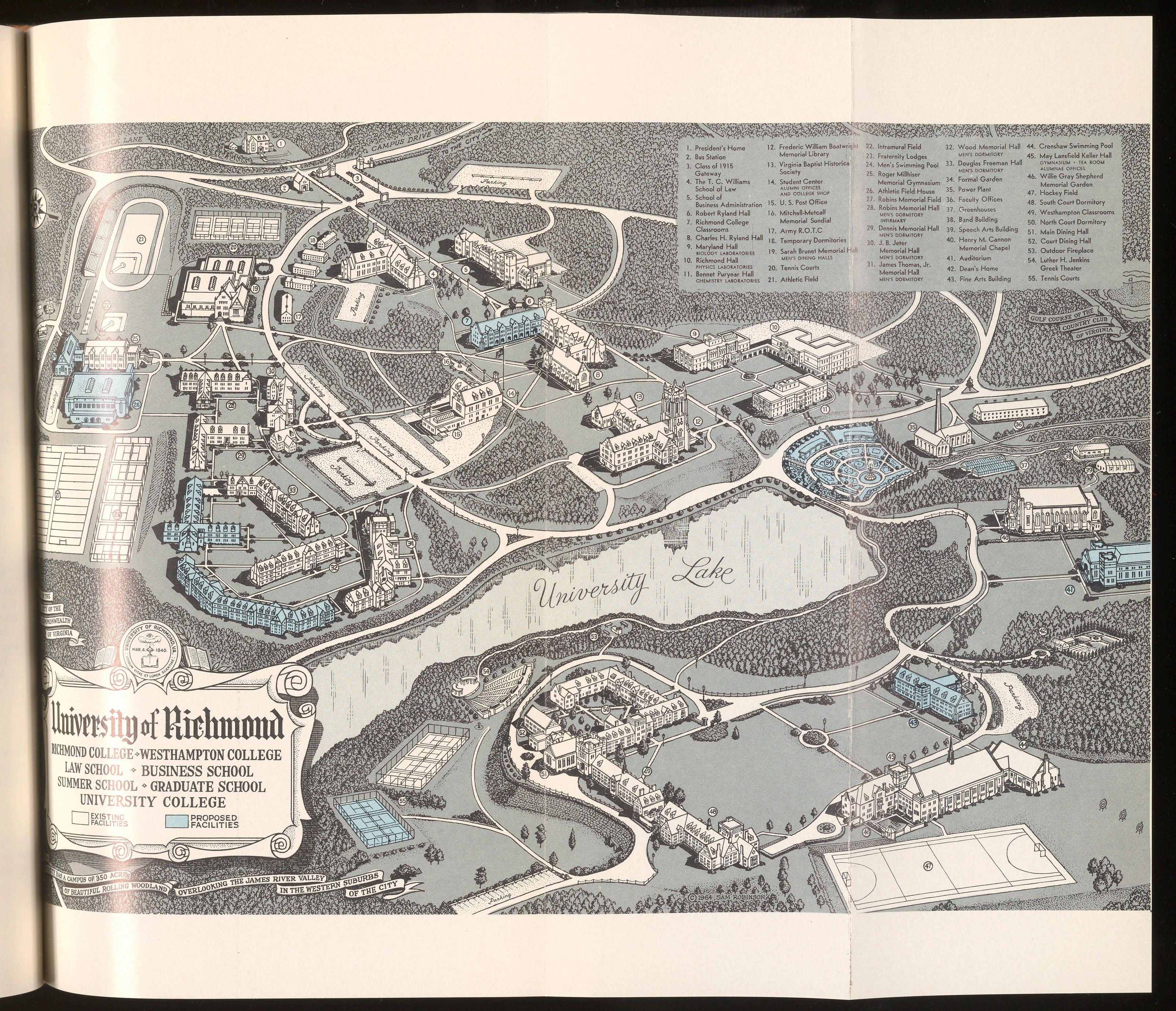FACULTY OF INSTRUCTION
SPENCER D. ALBRIGHT, JR., PH.D .........Professor of Political Science
RoBERT S. ALLEY, PH.D .................................Associate Professor of Bible and Religion
H. PEARCE ATKINS, PH.D .........................Professor of Mathematics
PETER B. BAHLER, M.A ............................. lnstructor in Mathematics and Director of the Computer Center
LEWIS F. BALL, PH.D ...........................................Professor of English
JAMES A. BARTHELMEss, M.A ...................................... .lnstructor in Ancient Languages
RoBERT H. BELL, B.S ..................................... lnstructor in Chemistry
WILBUR A. BENWARE, M.A ............. Laboratory Assistant in German
THOMAS S. BERRY, PH.D .................Associate Professor of Economics
KENNETH A. BLICK, PH.D .............Visiting Lecturer in Psychology, Associate Professor of Psychology, Randolph-M aeon College
ERNEST C. BoLT, JR., PH.D .................Assistant Professor of History
IRBY B. BROWN, PH.D .........................Assistant Professor of English
JAMES E. BROWN, PH.D .......................................Associate Professor of Business Administration
MARK E. CARDONA, B.A Laboratory Assistant in French
HUMBERTO I. CARDOUNEL, DR. EN DRo., DR. EN C.S.P.E. Assistant Professor of Spanish
MERTON E. CARVER, PH.D Professor of Psychology I
JOHN S. CATLIN, M.A ..................... lnstructor in Ancient Languages
RANDOLPH C. Cox, JR., M.A. ........................ lnstructor in Spanish
BuRKE CROWDER, M.S lnstructor in Psychology
W. HARRISON DANIEL, PH.D .............Associate Professor of History
ALBERT C. DAWSON, M.A. ............................... .lnstructor in Spanish
R. DEAN DECKER, PH.D .....................Assistant Professor of Biology
JEAN NEASMITH DICKINSON, M.S .............. .lnstructor in Psychology
WILLIAM A. DoRSEY, B.S Visiting Lecturer in Biology Chief, Richmond Public Health Laboratories
SUMMER SCHOOL, 1967 5
RICHARD R. DUNCAN, PH.D. Assistant Professor of History
RICHARD B. EATON, PH.D .................Assistant Professor of English
WILLIAM D. FLOYD, ED.D •...••........... Visiting Lecturer in Education Associate Professor, Central Washington College
E. ELWOOD FoRD, M.B.A., LL.B., C.P.A Associate Professor of Accounting
W. RoLAND GALVIN, M.A ................. Visiting Lecturer in Education Principal, Westhampton Jr. High School
E. SHERMAN GRABLE, M.A. ........ Associate Professor of Mathematics
E. W. GREGORY, JR., PH.D ...............................Professor of Sociology
GARLAND 0. GUNTER, PH.D Assistant Professor of English
WILLIAM B. GUTHRIE, PH.D .............Associate Professor of English
HENRY 0. GWALTNEY, ED.D.............Visiting Lecturer in Psychology
JAMES H. HALL, JR., PH.D .............Associate Professor of Philosophy
ALLAN S. HAMMOCK, M.A Visiting Lecturer in Political Science
DAN HARTMAN, B.A ................................. Visiting Lecturer in French
NATHANIEL H. HENRY, PH.D .............Associate Professor of English
RICHARD E. HUMBERT, ED.D.............................Associate Professor of Physical Education
IVER P. IVERSEN, M.A ................... ..Instructor in Ancient Languages
FLOYD F. JENKINS, M.A .............. ....... Visiting Lecturer in Education
CLARENCE R. JuNG, JR., PH.D .....................Professor of Economics
FRANCIS B. LEFTWICH, PH.D .............Assistant Professor of Biology
WILLIAM H. LEFTWICH, PH.D .......Associate Professor of Psychology
R. WAYNE MAJOR, PH.D .....................Assistant Professor of Physics
LAILA MALEY, M.A ........................... Laboratory Assistant in Spanish
W.M. MARR, JR., PH.D .....................Associate Professor of German
RosE MARIE MARCONE, PH.D .........................Assistant Professor of Spanish and Italian
RrcHARD A. MATEER, PH.D Assistant Professor of Chemistry
HUGHES Y. R. MATHIEU, BACCALAUREAT •.•••..• lnstructor in French
LEONARD D. McNEAL, M A ........ .Assistant Professor of Physical Education
JAMES A. MONCURE, PH.D ......... Professor of History Associate Dean of Liberal Arts, University College
CLARENCE MONK, PH.D .............Associate Professor of Mathematics
JERRY D. MORTON, M.A ................................•... Jnstructor in English
UNIVERSITY OF RICHMOND
FREDERICK C. NEUMANN, PH.D .............................Professor of Music
FRANCIS L. NYE, M.A ........................................ .Instructor in English
CATHERINE A. PASTUHOVA, PH.D .......................Visiting Lecturer in Modern Languages
RICHARD L. PATTEN, M.S ............................ Jnstructor in Psychology
J. STANTON PIERCE, PH.D. D.Sc .....................Professor of Chemistry
W. ALLAN PoWELL, PH.D ...............................Professor of Chemistry
JAMES W. RACHELS, JR., PH.D .......Assistant Professor of Philosophy
WILLIE M. REAMS, JR.,PH .D .............Associate Professor of Biology
0. WILLIAM RHODEN HISER, TH.D .........Associate Professor of Bible
NOLAN E. R1cE, PH.D .........................................Professor of Biology
JAMES A. SARTAIN, PH.D .................Associate Professor of Sociology
GERALD C. SCHAEFER, M.S ...... ......................... .Instructor in Biology
TALBOT R. SELBY, PH.D Professor of Ancient Languages
FRANCIS W. S1ssoN, ED.D ................. Visiting Lecturer in Education, Assistant Superintendent, Richmond Public Schools
N. WILFORD SKINNER, M.A .............Associate Professor of German
SLADE W. SKIPPER, M.A ...........................Instructor in Mathematics
HELEN LOUISE SMITH, M.A Assistant Professor of Education E l'h
SAMUEL W. STEVENSON, PH.D ...........................Professor of ng zs
HENRY H. STEWART, PH.D .................Assistant Professor of Sociology
MARION J. STOKES, M.A. ............Assistant Professor of Mathematics
CARTER W. STONE, M.A. ................................... .Instructor in French
JERRY L . TARVER, PH.D ................ ......Associate Professor of Speech
JACKSON J. TAYLOR, M.S .....................Associate Professor of Physics
WILTON R. TENNEY, PH.D ...... Associate Professor of Biology
HERMAN P. THOMAS, PH.D .............................Professor of Economics
CHARLES TURNEY, PH.D .....................Associate Professor of English
THOMAS B. VASSAR, II, M.S ...................Instructor in Mathematics
HARRY M. WARD, PH.D .......................Associate Professor of History
RussELL G. WARREN, B.S. IN B.A. Instructor in Economics
WARWICK R. WEST, JR., PH.D Professor of Biology
R. BARRY WESTIN, PH.D .....................Assistant Professor of History
CHARLES F WILTSHIRE, M.A. ...................... ...... Visiting Lecturer in Political Science
WILLIAM S. WooLCoTI, JR., PH.D .....Associate Professor of Biology
FRED 0. WYGAL, M.A ........................ .Visiting Lecturer in Education
ADMINISTRATION
Requirements for Admission
For admission to the Summer School, the applicant must be at least sixteen years of age, and the graduate of an accredited secondary school, except that students twenty-one years of age and over who are not graduates of accredited secondary schools, but who meet other qualifications, may enter as Special Students, but not as candidates for degrees.
All applicants who have not previously been enrolled in the University of Richmond must present their entrance credentials.
Students planning to enter Summer School directly after graduating from high school must submit transcript of high school work, including scores on the Scholastic Aptitude Test and three Achievement Tests of the College Entrance Examination Board. The Achievement Tests must be in English, mathematics (level I or level II), and a third ·one of the student's choice. Students who have had a copy of their high school transcript and the above test data sent to Richmond College or Westhampton College need not send duplicate to the Summer School. For information concerning test dates and testing centers for the College Entrance Examination Board, the candidate should inquire of his high school counselor or principal, ·or write to the Educational Testing Service, Box592, Princeton, New Jersey 08540.
Those applying for admission from accredited colleges or universitiesneed not send a complete transcript of their college work unless they also wish to apply for admission to some other division of the
University of Richmond. For admission to the Summer School only, the applicant must present on a form which will be sent with the application blank a statement from the dean or registrar of the institution in which he is currently enrolled to the effect that he is in good standing and that his proposed summer courses are approved. If a student's status changes after this statement is issued, his admi ssion to the Summer School is governed accordingly. A student who wishes to remove a scholastic deficiency must be certified as eligible to return to his college in September, 1967, upon successful completion of his Summer School work.
All applications, together with other necessary papers, such as transcripts or Certification ·of Standing form, should be received in the Summer School office not later than one week prior to the opening of Summer School. Of course, the earlier an application is cleared, the greater are the applicant's chances of getting the classes he desires.
Special Opportunity for High School Students
The University will admit qualified high school students who will have completed the work of the junior year by the close of the current session.
The Summer School affords to those accepted an opportunity to enrich their academic background by participating in college level courses for full credit. It also introduces the student to the stimulating college community, and presents an academic challenge to the ambitious student.
All freshman level courses are open to those high school students whose scholastic achievement and aptitude clearly indicate preparedness for such work. Students will enroll as full time Summer School students subject to all rules and regulations of the Univ ersity of Richmond Summer School. Credit earned in this program will be kept on file to be applied to the student's degree program if he is accepted to Richmond College or Westhampton College upon graduation from high school, or a transcript will be forwarded to another college if requested by the student. It is always the receiving institution which has the right to evaluate any credits presented to it. The credits are not transferable to a secondary school.
Special admission requirements for students in this experimental program include the following: ( 1) rank in the top fifth of the junior class; (2) aptitude and achievement test scores that clearly indicate capacity for college level study; ( 3) evidence of interest and deter-
SUMMER SCHOOL, 1967 13
mination to meet the challenge of college level work; and ( 4) recommendation of the high school principal (or headmaster) or guidance counselor. The Summer School cannot guarantee consideration of any application for this special program received after June 1, 1967.
Application Procedure
High school juniors should request their high school to send transcript of their high school work through the first semester of their junior year, together with appropriate test data. A supplementary transcript showing the work of the final semester of their junior year should be forwarded as soon as possible prior to June 12.
High school graduates should request their high school to send transcript of their high school work through the first semester of their senior year, together with College Board scores and other test data. A supplementary transcript showing the work of their final semester of high school and the date of their graduation should be forwarded prior to June 12.
Applicants from accredited colleges must have their dean or registrar send a Certificate of Standing form in lieu of a transcript. Holders of a Bachelor's degree must have transcript of all college work undertaken sent to the Dean of the Graduate School regardless of whether they intend to take work for graduate or undergraduate credit.
All applicants: An application fee of $10.00, which is not refundable must accompany every application for admission. If the applicant is accepted and matriculates, this $10.00 fee is applied to the matriculation fee.
Matriculation
Students who have been accepted for admission register for either term or for both terms Monday, June 12, from 8:00 A.M., to 11: 30 A.M., and from 1: 00 P.M. to 2: 00 P.M. Students attending the second term only will register on Wednesday, July 19, from 1:00 P.M. to 3: 30 P.M. if they did not register previously on June 12.
Regular class work will begin at 8: 00 A.M. Tuesday, June 13, for the first term and Thursday, July 20, for the second term. Classabsences count from the first day.
After registration has been completed, no student is permitted to change from one course to another or from one section of a class to another without the approval of the Dean. No such change will be permitted for the first term after Wednesday, June 14, or for the
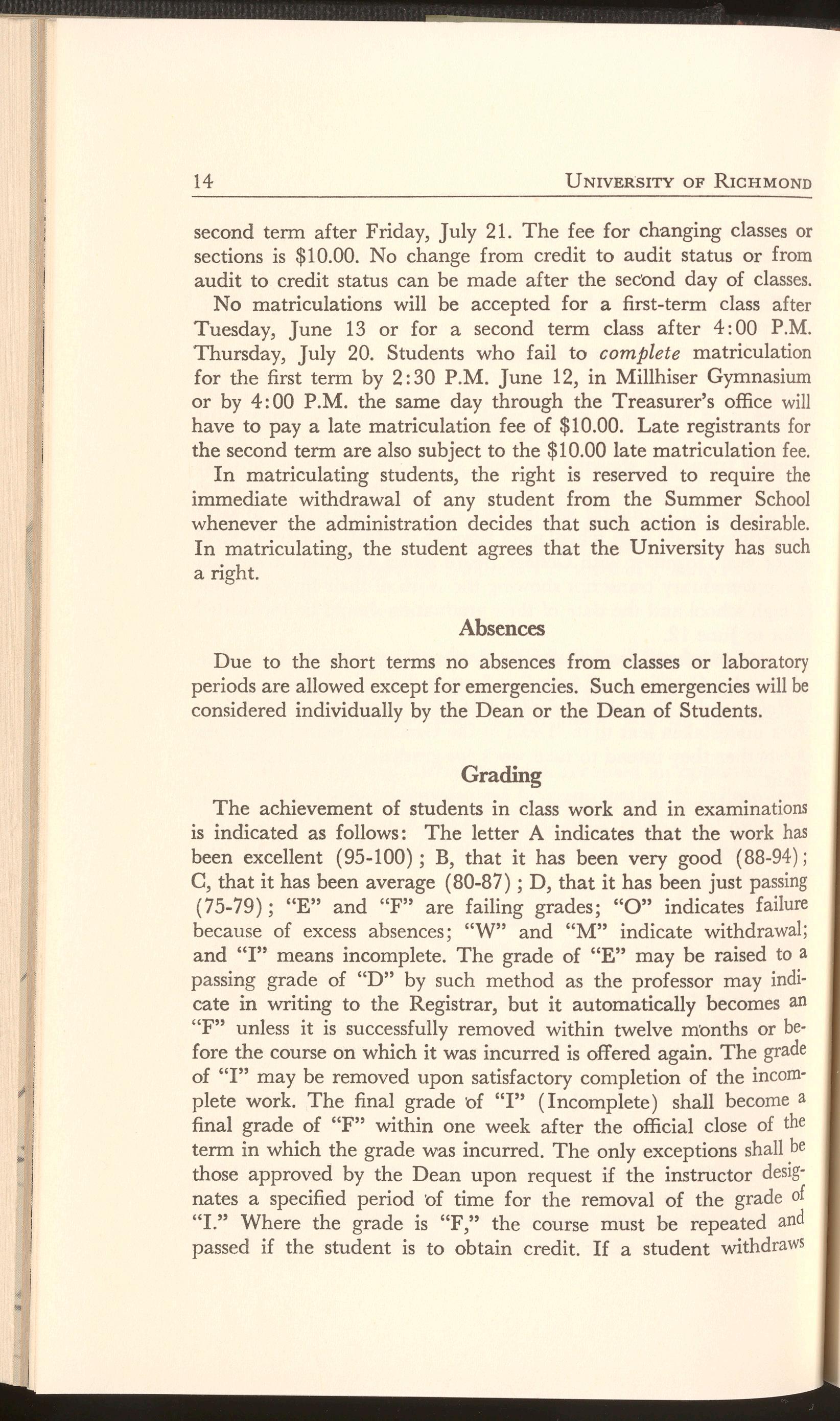
second term after Friday, July 21. The fee for changing classes or sections is $10.00. No change from credit to audit status or from audit to credit status can be made after the second day of classes. No matriculations will be accepted for a first-term class after Tuesday, June 13 or for a second term class after 4: 00 P.M. Thursday, July 20. Students who fail to complete matriculation for the first term by 2:30 P.M. June 12, in Millhiser Gymnasium or by 4:00 P.M. the same day through the Treasurer's office will have to pay a late matriculation fee of $10.00. Late registrants for the second term are also subject to the $10 .00 late matriculation fee. In matriculating students, the right is reserved to require the immediate withdrawal of any student from the Summer School whenever the administration decides that such action is desirable. In matriculating, the student agrees that the University has such a right.
Absences
Due to the short terms no absences from classes or laboratory periods are allowed except for emergencies. Such emergencies will be considered individually by the Dean or the Dean of Students.
Grading
The achievement of students in class work and in examinations is indicated as follows: The letter A indicates that the work has been excellent (95-100); B, that it has been very good (88-94); C, that it has been average (80-87) ; D, that it has been just passing (75-79); "E" and "F" are failing grades; "O" indicates failure because of excess absences; "W" and "M" indicate withdrawal; and "I" means incomplete. The grade of "E" may be raised to a passing grade of "D" by such method as the professor may indicate in writing to the Registrar, but it automatically becomes an "F" unless it is successfully removed within twelve m'onths or before the course on which it was incurred is offered again. The grade of "I" may be removed upon satisfactory completion of the incom· plete work. The final grade ·of "I" (Incomplete) shall become a final grade of "F" within one week after the official close of the term in which the grade was incurred. The only exceptions shall _be those approved by the Dean upon request if the instructor desig· nates a specified period of time for the removal of the grade of "I." Where the grade is "F," the course must be repeated and passed if the student is to obtain credit. If a student withdraws
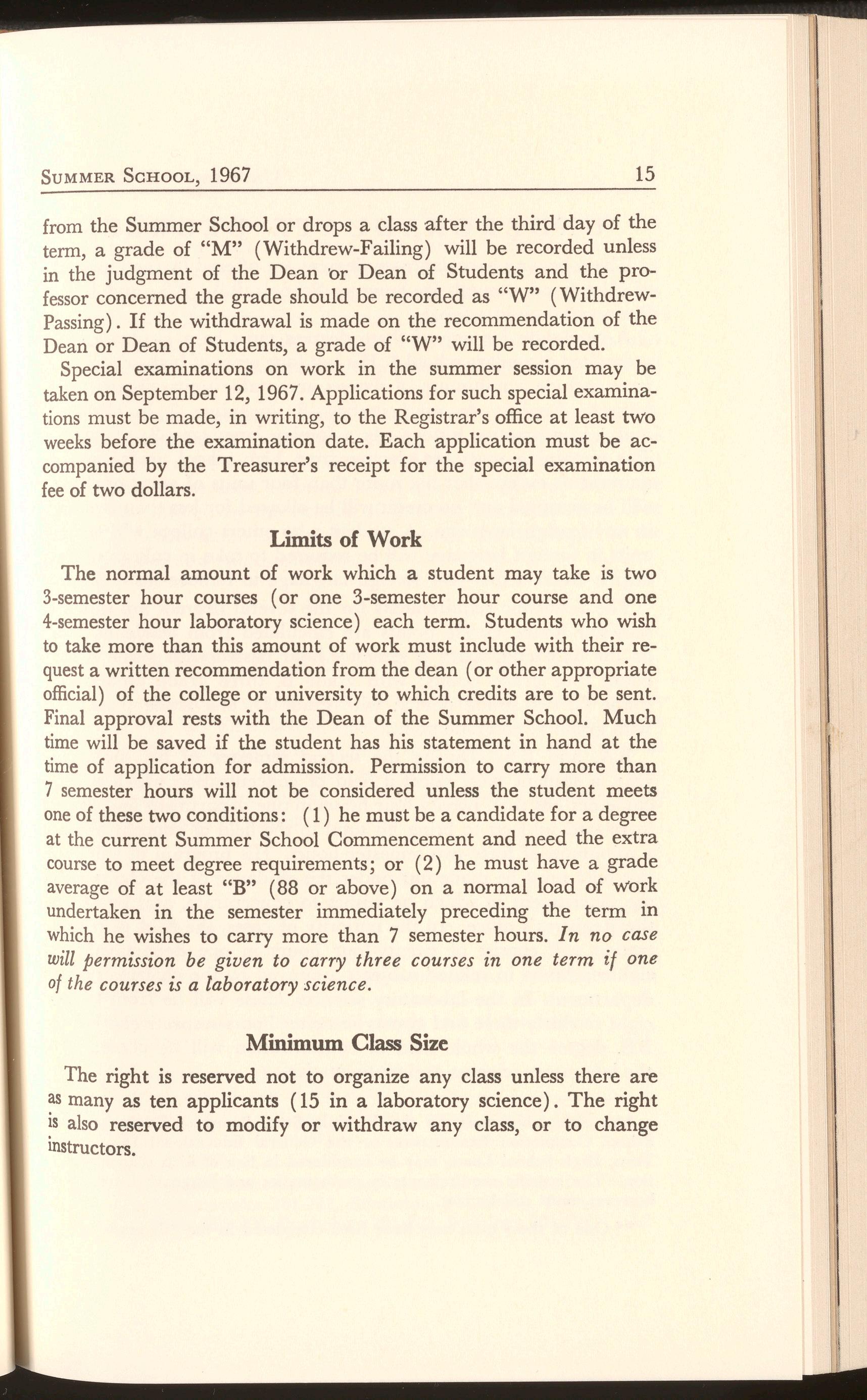
from the Summer School or drops a class after the third day of the term, a grade of "M" (Withdrew-Failing) will be recorded unless in the judgment of the Dean or Dean of Students and the professor concerned the grade should be recorded as "W" ( WithdrewPassing ) If the withdrawal is made on the recommendation of the Dean or Dean of Students, a grade of "W" will be recorded. Special examinations on work in the summer session may be taken on September 12, 1967. Applications for such special examinations m ust be made, in writing, to the Registrar's office at least two weeks before the examination date. Each application must be accompanied by the Treasurer's receipt for the special examination fee of t wo dollars
Limits of Work
Th e normal amount of work which a student may take is two 3-semester hour courses ( or one 3-semester hour course and one 4-semester hour laboratory science) each term. Students who wish to tak e more than this amount of work must include with their request a written recommendation from the dean (or other appropriate official) of the college or university to which credits are to be sent. Final approval rests with the Dean of the Summer School. Much time will be saved if the student has his statement in hand at the time of application for admission. Permission to carry more than 7 semester hours will not be considered unless the student meets one of these two conditions: ( 1) he must be a candidate for a degree at the current Summer School Commencement and need the extra course to meet degree requirements; or (2) he must have a grade average of at least "B" (88 or above) on a normal load of work undertaken in the semester immediately preceding the term in which he wishes to carry more than 7 semester hours. In no case will pe rmission be given to carry three courses in one term if one of the courses is a laboratory s cience.
Minimum C~ Size
Th e right is reserved not to organize any class unless there are as many as ten applicants ( 15 in a laboratory science) . The right !8 also reserved to modify or withdraw any class, or to change mstructors.
UNDERGRADUATE DEGREES
The following baccalaureate degrees are offered by the University of Richmond through its Summer School: B.A., B.S., and B.S. in Business Administration.
A candidate for any of these degrees must be a graduate of an accredited secondary school.* His last four years of high-school work must include a minimum of sixteen acceptable units, distributed as follows: English--4; mathematics-3, including 2 in algebra** and 1 in geometry; history-1 ; a foreign language-2; science-1. The remaining units are elective from high school graduation requirements except that not more than four units of vocational work will be accepted and no credit will be allowed for less than two units in any foreign language. A student who enters college without two units in foreign language will be required to take in college without degree credit a first-year foreign language to remove his deficiency. The academic requirements for the several degrees are stated in semester hours. Grade points are calculated from academic hours on the following basis: a semester hour passed with grade A shall c·ount four grade points; with grade B, three grade points; with grade C, two grade points; with grade D, one grade point; and with grade F, no grade point.
B.A. and B.S.-During the second semester of his sophomore year, a student must select a field of concentration which will include not less than twenty-four hours in one department and courses in related subjects to bring his total in the field of concentration to a minimum of forty-two semester hours. His program of studies in this field must be made out under the guidance of the chairman of the department in which he wishes to concentrate, and be filed in the Registrar's office. In the majority of cases, the field of concentration will consist of twenty-four hours in one department and eighteen hours in related subjects approved by the chairman of the department. In the laboratory sciences, these will be from twenty· eight to thirty-three and twenty semester h·ours respectively. For the B.S. degree the whole field of concentration will be chosen from the laboratory sciences and mathematics.
*An acceptable score on the Virginia State Board of Education High School Completion Examination or the General Educational Development Tests, High School Level, may be considered in lieu of high school gradua· tion. The specific requirements in mathematics and language listed above, however, must still be met.
** One of these units may have been completed in the 8th grade.
SUMMER SCHOOL, 1967 17
B.S. in Business Administration-Students who wish to enter the School of Business Administration as full-time students must have completed sixty semester hours and must have earned a minimum of a true "C" average on total hours attempted. In selecting applicants for admission, the School of Business Administration is interested in men and women with well-rounded liberal arts backgrounds who have given evidence of earnestness of purpose and have demonstrated leadership qualities.
At least sixty semester hours of approved junior and senior courses, including all those taken during the senior year, must be passed with credit at the University of Richmond; and at least forty-five of these sixty semester hours must be selected from the curriculum offered by the School of Business Administration. For a detailed explanation of this degree, consult the catalogue of the School of Business Administration.
DEGREE
REQUIREMENTS
A candidate for a degree must offer at least 124 semester hours, including not less than 120 academic hours. A student who offers only this minimum amount of work must earn at least twice as many grade points as the total number of semester hours of academic work attempted during his college career, this total to be computed semester by semester.
Bachelor of Arts
I. REQUIRED COURSES
ENGLISH 101-102, 203-204
MATHEMATICS.One of the following combinations: 106-105; 151-104; 151-152; or 251-252 ............................................. . FOREIGNLANGUAGES:The second year in each of two foreign languages
NATURALSCIENCES (Biology, Chemistry, Physics): The first year in one of the above sciences ......................... . BIBLE: Course 203 and one additional course selected from 206, 207, 307, 310, and 311
HISTORY 107-108 .........................
OTHER SocIAL SCIENCES. Six hours in each of two of the following: Economics 201-202, Education, Philosophy, Political Science 205-206, Psychology 201-202, Sociology 201-202
Bachelor of Science
REQUIRED COURSES
(Mathematics 151-152 or equivalent is prerequisite to Mathematics 251-252 . )
FOREIGNLANGUAGES:The second year in each of two foreign languages or two years in one foreign language above course 101-102
SocIAL SCIENCES. Six hours in one of these social sciences: Economics 201-202, Education, Philosophy, Political
EXPENSES
Board for non-resident students, each term.......... .. 90.00
Bachelor's diploma fee (must be paid by Aug. 1) .. 5.00
Master's diploma and hood fee ( must be paid by Aug. 1) ......... ...... ........................................... .. 25.00
Late registration or change of class fee................. ... 10.00
Auditing (attending without credit) per course.... . 55.50
All charges are due at the time of registration. Checks should be made payable to University of Richmond.
Notes
A student is not fully matriculated for either term until satisfactory a rrangements have been made with the Treasurer for the fees for tha t term and his full course of study and schedule of classes have been finally approved by the Dean's Office. Students who fail to comp let e matriculation for th e first term by Monday, June 12, 1967, or Wednesday, July 19, 1967, for the second term, will be charged an extra fee of $10.00. For changing a class or section after matriculation is compl e ted ( except for administrative changes), a fee of $ 10.00 is charged.
Students are matriculated for a full term. In case of withdrawal for whatever cause, no refund of fees or any part of fees is made. In the event of withdrawal on account of student's sickness, proportionate deductions may be made in the charge for board.
A veteran attending under Public Law 894 should have his Certificate of Eligibility and Entitlement when he registers. If he does not have a valid certificate, he will be required to make a deposit which will be equivalent to his fees and the cost of books and supplies.
A vet eran attending under any other Public Law must present a Certificate ·of Education and Training. These veterans will be required to pay their fees in the same manner as non-veteran students The courses in which veterans enroll must be acceptable for satisfying degree requirements.
Students must register at matriculation all motor vehicles used on the campus and must abide by regulations concerning the use and parking of such vehicles. Failure to register a motor vehicle or abide ~y the regulations will subject the student to penalties. These regulationsa re given to the student at the time of matriculation .
SCHEDULE OF CLASSES
8:00-9:30
Course-First Term
Accounting S303
Bible S203
Biology Sl0l (a)
BiologySl0l (b)
Biology 101 ( d)
Chemistry S 101C
Chemistry S305C
Economics S201 (a)
Education S337*
Education S356*
Education S481
English Sl0l (a)
English S203 (a)
English S363*
French Sl0l (a)
French S103(a)
German Sl03
Greek Sl0l
History S107 (a)
History S205 (a)
History S305*
Latin S103(a)
Latin S312*
Mathematics S151 (a)
Mathematics S251
Philosophy S361 *
Physical Education S365
Political Science S205 (a)
PsychologyS201 ( a)
PsychologyS435
Sociology S201
Sociology S315*
Spanish Sl03 (a)
Accounting S301
Biology SlOl (a)
BiologySlOl (b)
Biology Sl0l(c)
B(ology101 ( d)
Biology S210
Chemistry Sl0lL
Chemistry S20!lC
Chemistry S305L
Room
SBA 210
SBA 200
MH 102
MH 202
UC
PH 108
PH 13
SBA 212
RyH 302
RH 213
RyH 211
RyH 103
FB 101
FB 102
FB 103
ASB 1
FB 104
RyH 110
MH 213
RyH 104
RyH 15
RyH 16
MH 211
RH 213
RH 204
RH 206
RyH 302
Gym
RH 6
RyH 109
RyH 211
PH 5
PH 16
RyH 111
9:45-11 :15
SBA 210
MH 102
MH 202
MH 2
UC
MH 13
MH 4
PH 103
PH 16
PH 204
Course--Second Term
Accounting S304
Bible S207
Biology S102(a)
Biology S102(b)
Biology 102 ( d)
Chemistry S 1020
Chemistry S306C
Economics S202 (a)
Education S467
Education S578
English Sl02(a)
English S204(a)
English S305*
French S102(a)
French S104(a)
German S104
Greek S102
History Sl08 (a)
History S206(a)
History S306*
Latin Sl04(a)
Mathematics S152 (a)
Mathematics S252
Philosophy S362*
Physical Education S339
Psychology S202(a)
Psychology S424
Sociology S202
Spanish Sl04(a)
Accounting S302
Biology S 102 (a)
Biology S102(b)
Biology S102(c)
Biology 102 ( d)
Biology S311 *
Chemistry S102L
Chemistry S210O
Chemistry S306L
Course-First Term
Economics S201 (b)
Economics S301
Education S326(a)
Education S329*
Education S353
Education S380
Education S548
English Sl0l(b)
English S203(b)
English S316*
English S520
French Sl03(b)
German Sl0l
History S107(b)
History S203
History S205 (b)
Latin Sl0l
Mathematics Sl05 (a)
Mathematics Sl06(a)
Mathematics S299
Term
SBA 218 Economics S202 (b)
SBA 212 Economics S3 l 2
RyH 211 Education S341 (a)
PH 5
RyH 109 Education S354*
RyH 301
RyH 103 Education S458
SBA 200 Education S580
FB 101 English S102(b)
FB 102 English S204(b)
FB 103 English S371*
RH 6 English S511
FB 104 French Sl04(b)
RyH 110 German Sl02
RyH 104 History Sl08(b)
MH 211 History S204
RyH 15 History S206 (b)
MH 213 Latin Sl02
RH 204
RH 206 Mathematics S105(b)
SBA 306
Physical Education S360 Gym Physical Education S364
Physics S103
Political Science S205 (b)
Psychology S310(a)
Psychology S337
Sociology S329*
Spanish Sl0l (a)
Spanish Sl03(b)
Speech Sl0l
Bible S311
Biology Sl0l ( c)
Biology S210
Chemistry S209L
Economics S 31 7
Education S323
Education S326 (b)
Education S350
Education S501
Education S559
Education S579
English Sl0l(c)
English S203(c)
English S301 *
RH 101 Physics S104
RyH 16 Political Science S206
RyH 211 Psychology S341 (a)
RyH 301
RyH 103 Psychology S421
PH 5
ASB 1 Spanish Sl02(a)
RyH 111 Spanish Sl04(b)
RH 214
Speech S102
11 :30-1:00
SBA 200 Religion S332*
MH 2 Biology S 102 ( c)
MH 13
MH 4
Biology S3 l l *
PH 208 Chemistry S210L
SBA 212 Economics S309
RyH 103 Education S324
RyH 211 Education S341 (b)
RyH 104 Education S351 *
RyH 102 Education S559
SBA 210
RH 6
FB 101
English S102(c)
FB 102 English S204(c)
FB 103
English S323*
SUMMER SCHOOL, 1967
Course-First Term Room
French Sl0l (b)
French Sl03(c)
Greek S203
ASB 1
FB 104
MH 213
Term
French S102(b)
French S104(c)
Greek S204
History S107(c) RyH 15 History S108(c)
Latin Sl 03 (b)
Mathematics S106(b)
Mathematics S151(b)
MH 211
Latin Sl04(b)
RH 206 Mathematics S 105 ( c)
RH 204 Mathematics S152 (b)
Philosophy S201 SBA 106 Philosophy S202
Physical Education S355 Gym
Physics Sl03
RH 101 Physics S104
Political Science S319* RyH 16
Political Science S325*
Psychology S201 (b) RyH 109 Psychology S202 (b)
Psychology S 310 (b) RyH 211 Psychology S 341 (b)
Sociology S303*
PH 5
Spanish S 103 ( c) RyH 111
Speech S201
French S304*
French S531
Spanish S304*
Spanish S533
French S109(a)
French S109 (b)
French Sl 11 (a)
French S 111 ( b)
French Sll 1 (c)
German Sl09
German Sl 11
Spanish Sl09
Spanish Sl 11 (a)
Spanish Sl 11 (b)
Spanish Slll (c)
Sociology S301 *
Spanish Sl04(c)
RH 214 Speech SlOl
RH 214 Speech Sl05
Afternoon Classes
1:15-2:45p.m., RyH 110
3:00-4:30p.m., RyH 301
1: 15-2 :45 p.m., RyH 111
3: 00-4: 30 p.m., RyH 302
French S532
Spanish S534
Modem Language Laboratories
7: 45-8: 35 a.m., RyH 303
10:40-11 :30 a.m., RyH 303
12: 30-1 : 20 p.m., RyH 303
1 : 30- 2: 20 p.m., RyH 301
2:30- 3:20p.m., ASB 1
1 : 30-2: 20 p.m., RyH 302
11: 35-12: 25 p.m., RyH 303
1: 30- 2: 20 p.m., RyH 303
8:40- 9:30a.m., RyH 303
9:45-10:35 a.m., RyH 303
2: 30-3: 20 p.m., RyH 303
* Courses may be taken for graduate credit
French Sll0(a)
French Sll0(b)
French S112(a)
French Sl12(b)
French Sl12(c)
German Sll0
German Sl12
Spanish Sll0
Spanish S112(a)
Spanish Sl12(b)
Spanish Sl 12(c)
In the laboratory sciences, C or L after the number indicates class and laboratory respectively. The small letters (a), (b), etc., indicate sections of the same class.
ASB indicates Air Science Building; FB, Faculty Building; MH, Maryland Hall; PH, Puryear Hall; RH, Richmond Hall; RyH, Ryland Hall; SBA, School of Business Administration, UC, University College, Lombardy Street at Broad.
COURSES OF INSTRUCTION
Courses numbered 100-199, inclusive, are intended primarily for freshmen; those numbered 200-299, inclusive, for sophomores; those numbered 300-399, inclusive, for juniors and seniors and, in some cases, for graduate students; those numbered 400-499 require work of a research nature for graduate credit; those numbered 500-599 are for graduate students only. Courses numbered 300-399 whose number is followed by an asterisk (*) may be taken by graduate students for graduate credit as one of the "400" courses mentioned above.
The figure in parentheses following the title of a course indicates the number of semester hours credit allowed for that course. Where two numbers, separated by a hyphen, follow the title of a full year course, either half of the course may be taken without the other half except where a prerequisite is stated.
Accounting
AccouNTING
S301-S302-Fundamentals of Accounting. (6)
Basic accounting theory and procedures; adjusting and closing en• tries; working · papers; journals and ledgers; financial statements, analysis of financial statements; individual proprietorships, partner• ships, and corporations; accounting controls and concepts. Required of all degree candidates. 9:45 A.M. School of Business 210 First Term, Mr. Ford. Second Term, Mr. J. E. Brown.
AccouNTING
S303-S304-Accounting Theory. (6)
The structure of accounting theory; practical applications of theoretical concepts in financial statements and income determination; consideration of current controversies in accounting theory and practice. 8: 00 A.M. School of Business 210. First Term, Mr. Ford. Second Term, Mr. J. E. Brown.
Bible and Religion
BIBLE S203-An Introduction to the Bible. (3)
A study of its general content, unique character, great ideas, historical continuity, relevance, and nature of its books. A study of the origin and translation of the Bible is included. First Term. 8: 00 A.M., School of Business 200. Mr. Alley .
BIBLE S207-The Life and Teachings of Jesus. (3)
A study of the life and teachings of Jesus, as presented in the Gospels. Second Term. 8: 00 A.M., School of Business 200, Mr, Rhodenhiser.
SUMMER SCHOOL, 1967
BIBLE S311-Christian Life and Thought in the Age of the Apostles. (3)
A study of the New Testament following the Gospels, with emphasis upon the life and thought of the early Church and its further development in the Age of the Fathers. First Term. 11: 30 A.M., School of Business 200. Mr. Alley.
RELIGION S332*-American Christianity. ( 3)
Religion in America from the 17th to the 20th century with special emp hasis upon the struggle for religious liberty, the great awakening, denominational development and the Ecumenical Movement. Attention to Roger Williams, Jonathan Edwards, Walter Rauschenbush and Rheinhold Niebuhr. Second Term 11: 30 A.M ., School of Business 210. Mr. Rhodenhiser.
Biology
BIOLOGY S101-S102-Principles of Biology. (8)
The fundamental principles of biology and their application to man. Biology SlOl is offered in the first term and is prerequisite to Biology S102 which is offered in the second term. All sections meet in Mary. land Hall.
Section (a): 8: 00-11: 15 A.M., Room 102. First Term, Mr. Woolcott. Second Term, Mr. Woolcott .
Section (b): 8:00-11:15 A.M., Room 202 . First Term, Mr. Tenney. Second Term, Mr Decker
Section (c): 9:45 A.M.-1:00 P .M., Room 2, First Term. Mr. Rice. Second Term, Mr Leftwich .
Section ( d) : 8: 00-11: 15 A.M., University College Laboratory. First Term, Mr. Schaefer . Second Term, Mr Schaefer .
BIOLOGY S210--Comparative Vertebrate Anatomy. (4)
The comparative anatomy and biology of the several systems of organs of representative vertebrate animals. Prerequisite: Biology 101 and 102 or equivalent. First Term. 9:45 A.M.-1 :00 P.M., Maryland Hall 13. Mr. West.
BIOLOGY S311*-Histology. (4)
The microscopic structure of tissues and organs. Prerequisite: Biology 101-102 or equivalent. Second Term. 9:45 A.M.-1:00 P.M., Maryland Hall 4 Mr. Rice .
BIOLOGYS341-S342-Public Health Laboratory Methods. (8)
Laboratory work provided by the Public Health Laboratory of the City of Richmond. A limited number of qualified biology majors approved by the joint staffs of the Public Health Laboratory and the University of Richmond may register for this course. Richmond Public Health Laboratory. Mr. Dorsey.
BIOLOGY S525-0ntogeny of Sex ( 1)
First Term. Time arranged. Mr. Reams.
BIOLOGY S526-Survey of the Plant Kingdom . ( 1) Second Term. Time arranged. Mr. Decker
BIOLOGY S527-Topic to be selected. (1) First Term. Time arranged. Staff.
BIOLOGY S528-Topic to be selected. ( 1) Second Term. Time arranged. Staff.
BIOLOGY S549-S550-Thesis. (2-2)
A research problem pursued under the guidance of a member of the staff. By arrangement.
Chemistry
CHEMISTRY
S101-S102-General Chemistry. (8)
Chemistry SlOl is offered in the first term and is prerequmte to Chemistry S1O2 which if offered in the second term. Lecture 8:009: 30 A.M., Puryear Hall 108. Laboratory 9:45-11:15 A.M , Room 103. First Term, Mr Mateer; Second Term, Mr. Bell
CHEMISTRY
S209-Chemical Principles. ( 4)
A study of important principles of chemistry including stoichiometry, properties of solutions, equilibrium, and electrochemistry. Qualitative inorganic analysis is included and is used to illustrate the principles discussed. Prerequisite: Chemistry 101-102. First Term, Lecture 9 :45-11 : 15 A.M., Puryear Hall 16. Laboratory, 11: 30 A M.• 1: 00 P.M., Puryear Hall 208. Mr. Powell
CHEMISTRY
S210-Quantitative Analysis. (4)
A study of the methods and techniques of gravimetric, volumetric, spectrophotometric, and potentiometric analysis . Prerequisite: Chemistry 209. Second Term. Lecture, 9: 45-11: 15 A.M ., Puryear Hall 16. Laboratory 11: 30 A.M.-1: 00 P.M., Puryear Hall 208. Mr. Powell,
CHEMISTRY
S215-Quantitative Analysis. (2)
Laboratory experiments for students who need two additional hours of quantitative analysis beyond Chemistry 210, which is prerequisite, First or Second Term. By arrangement. Mr. Powell.
CHEMISTRY
S305-S306-Organic Chemistry. (8)
Prerequisite: Chemistry SlO1-SlO2. Chemistry S3O5 is offered the first term and is prerequisite to Chemistry S3O6 which is offered the second term. Lecture, 8: 00-9: 30 A .M., Puryear Hall 13. Laboratory, 9: 45-11: 15 A.M., Room 204. Mr. Pierce.
Note: Students taking this course will find it to their advantag~ 10 have completed a course in Analytical Chemistry although thisis not required.
CHEMISTRYS320-lntroduction to Research. (3) By arrangement.
CHEMISTRYS320A-Introduction to Research. (2) By arrangement.
CHEMISTRYS520, S520A, S520B-Research (Maximum credit of five semester hours per term for a total of ten semester hours.) By arrangement.
A letter following the number indicates the course is being continued for the second or third semester.
Economics
EcoNOMICSS201-S202-Principles of Economics. (6)
A survey course covering production, managerial economics, value and distribution, money and banking, international economics, and economic systems. Not open to freshmen.
Section (a): 8:00 A.M., School of Business 212. First Term, Mr. J. E. Brown, Second Term, Mr. Jung.
Section (b): 9:45 A.M., School of Business 218. First Term, Mr. J.E. Brown. Second Term, Mr. Warren.
ECONOMICSS301-Money and Banking. (3)
The course is concerned with the money system, credit and credit instruments, the commercial banking system, monetary policy, and specialized banking, as applied in the United States. Required of all degree candidates. First Term. 9: 45 A.M., School of Business 212. Mr. Thomas.
EcoNoM1cs S309-Government Regulaiton of Business. ( 3)
The economic bases for the regulation of private business; the development of federal regulation of industry; the elements of sound policy toward business. Second Term. 11: 30 A.M., School of Business 212. Mr. Warren.
ECONOMICSS312-Contemporary Economic Theory. (3)
An analysis of current economic thought with particular emphasis on the contributions of Marshall, Chamberlain, Keynes, and other economists of the twentieth century. Required of all degree candidates. Second Term. 9:45 A.M., School of Business 212. Mr. Jung.
EcoNoM1csS317-Business Fluctuations. (3)
A study of the seasonal, cyclical, and secular fluctuations in business, and various theories as to the causes and continuation of business fluctuations. First Term. 11: 30 A.M., School of Business 212. Mr. Berry.
Education
EDUCATIONS323-Principles of Secondary Education. (3)
Characteristics, objectives and scope of secondary education; its attempts to meet the needs of adolescents through administrative, curricular, and extra-class activities. First Term. 11: 30 A.M., Ryland Hall 103. Mr. Phippins.
30 UNIVERSITY OF RICHMOND
EDUCATION S324-Problems of the High School Teacher. (3) Instructional procedures; evaluation of pupil progress; participation in the total school program; community responsibilities; professional ethics. Second Term. 11: 30 A.M., Ryland Hall 103. Mr. Phippins.
EDUCATION S326---Educational Psychology. (3) First Term.
Section (a): 9:45 A.M., Ryland Hall 211.
Section (b) : 11: 30 A.M., Ryland Hall 211. (See PsYCHOLOGYS310.)
EDUCATION S329*-Educational Sociology. (3) First Term. 9:45 A.M., Puryear Hall 5. (See SOCIOLOGYS329*)
EDUCATION S337*-Philosophy of Education. (3) First Term. 8: 00 A.M., Ryland Hall 302. (See PHILOSOPHYS361*,)
EDUCATION S341-Human Growth and Deveolpment. (3) Second Term.
Section (a): 9:45 A.M., Ryland Hall 211. Section (b) : 11: 30 A.M., Ryland Hall 211. (See PSYCHOLOGYS341.)
EDUCATION S350-The Teaching of Reading. (3) Reading readiness, skill development, abilities of comprehension in several content areas, and the use of tests and instruction~ materials. Practical procedures for teaching reading in all the elementry grades. First Term. 11: 30 A.M., Ryland Hall 104. Mr. Floyd.
EDUCATION S351*-Children's Literature. (3)
A survey of children's literature from John Newbery to the present, with emphasis upon contemporary material available for both elemen• tary and junior high school age. Storytelling and creative drama are included. Wide reading is required. Second Term. 11: 30 A.M., Ryland Hall 104. Miss Smith.
EDUCATION S353-Principles of Elementary Education. (3) Aims and objectives upon which the organization, administration, and procedures of the elementary school are based. Prerequisite: Psychology 201-202. First Term. 9:45 A.M., Ryland Hall 109. Mr Floyd.
EDUCATION S354*-Problems of the Elementary School Teacher, Pupil needs; instructional procedures; evaluation of child growth; selection and use of teaching materials; parent-teacher relationship! Second Term. 9:45 A.M., Ryland Hall 109. Miss Smith.
EDUCATION S356*-The Teaching of High School Latin. (3) First Term. 8:00 A.M., Richmond Hall 213. (See LATIN S312*, )
EDUCATION S380-Elementary Statistical Methods. (3) First Term. 9:45 A.M., Ryland Hall 301. (See PsvcHoLOOY S337.)
SUMMER SCHOOL, 1967 31
EDUCATION S458-Child Behavior and Adjustment. (3)
Second Term. 9:45 A.M., Ryland Hall 103. (See PsYCHOLOOY S421.)
EDUCATION S467-Techniques of Counseling. (3)
Second Term. 8:00 A.M., Ryland Hall, 211. See PsYCHOLOGY S424.)
EDUCATION S481-Tests and Measurements. (3)
First Term. 8:00 A.M., Ryland Hall 211. (See PsYCHOLOOY S435.)
liOTE: A minimum of 18 semester hours in Education is prerequisite to al) graduate Education courses numbered 500-599.
EDUCATION S501-Seminar in Research Problems. (3)
Selection of a thesis topic; direction of the study; review of selected current professional literature. Offered each semester, but only three hours credit allowed even though the seminar lasts more than one semester. Hours by arrangement. Mr. Overton.
EDUCATION S548-lnterpreting the Work of the Schools. (3)
School-community relationships. The responsibility of the classroom teacher, the principal, the superintendent, and others in interpreting the schools to the community. Utilization of community re• sources to implement the school program. First Term. 9: 45 A.M., Ryland Hall 103 Mr. Phippins
EDUCATION S559-The Work of the Elementary School Principal. ( 3)
Philosophy of the modem elementary school; relation to the secondary school and the community; developing a functional instructional program based on the needs of children; supervisory and guidance functions of the principal . First Term. 11: 30 A.M. School of Business 210. Mr. Galvin .
EDUCATION S578-Human Relations in Teaching. (3)
Dynamics of teacher-pupil personality interaction affecting teachinglearning situations; diagnostic and remedial means and techniques for improving teaching-learning situations and processes. Second Term. 8:00 A.M., Ryland Hall 103. Mr. Wygal .
EDUCATION S579-School Personnel Management. (3)
. Classification; principles of personnel organization; organization in relation to morale; the participatory process; delineation of work and responsibilities among teaching, non-teaching, and supervisory personnel; appraisal and recognition of teaching effectiveness; economic a~d contractual relationships; other problems to meet class need. First Term, 11: 30 A.M., Richmond Hall 6. Mr. Sisson.
UNIVERSITY OF RICHMOND
EoucATION S580----School Law. (3)
Legal aspects of school administration including constitutional and statutory provisions and court decisions relating to education. Second Term. 9 :45 A.M., School of Business 200. Mr. Jenkins.
English
ENGLISH S101-Rhetoric and Composition. (3)
The elements of writing in theory and practice, and the beginning of a study of literature genres. One research paper to illustrate the use of library sources and preparation of bibliography and footnotes. First Term.
Section (a): 8: 00 A.M., Faculty Building 101. Mr. Nye.
Section (b): 9:45 A.M., Faculty Building 101. Mr. Henry.
Section (c): 11 :30 A.M., Faculty Building 101. Mr. Gunter.
ENGLISH S102-Rhetoric and Composition. (3)
A continuation of English Sl 01: the study of additional literary genres and frequent written assignments of a critical nature Second Term.
Section (a): 8:00 A.M., Faculty Building 101. Mr. Morton.
Section (b) : 9: 45 A.M., Faculty Building 101. Mr. Eaton.
Section (c): 11 :30 A.M., Faculty Building 101. Mr. Guthrie.
ENGUSH S203----Survey of English Literature. ( 3)
Analyses of the major works of English literature from Beowulfto Milton, along with a consideration of the historical backgrounds. Reading assignments, lectures, recitation, and parallel reading. First Term.
Section (a): 8: 00 A.M., Faculty Building 102. Mr. Stevenson.
Section (b): 9:45 A.M., Faculty Building 102. Mr. Ball.
Section ( c) : 11: 30 A.M., Faculty Building 102. Mr. Nye.
ENGLISH S204---Survey of English Literature. (3)
A continuation of English S203. A study of the major worksin English literature from the Restoration through the Nineteenth Cen· tury. Second Term.
Section (a): 8: 00 A.M., Faculty Building 102. Mr. I. B. Brown.
Section (b): 9:45 A.M., Faculty Building 102. Mr. Morton.
Section ( c) : 11: 30 A.M., Faculty Building 102. Mr. Turney.
ENGLISH S301*-Advanced Grammar. (3)
Intensive study of grammar and syntax. Designed to meet the stale certification requirements for teachers of English in secondary schools. First Term. 11: 30 A.M., Faculty Building 103. Mr. Henry.
ENGLISH S305*-American Literature. (3)
A survey of the literature of America from the beginnings to t;'. middle of the Nineteenth Century. Second Term. 8: 00 A.M., Facucy Building 103. Mr. Eaton.
SuMMER ScHooL, 1967 33
ENGLISH S316*-Shakespeare. (3)
A study of the tragedies of Shakespeake's maturity-Hamlet, Macbeth, Othello, King Lear. First Term. 9:45 A.M., Faculty Building 103. Mr. Stevenson.
ENGLISH S323*-Modern British and American Poetry. (3)
Twentieth century poetry in English. Second Term. 11: 30 A.M., Faculty Building 103. Mr. I. B. Brown.
ENGLISH S363*-Literature of the South. (3)
A survey of representative poetry and prose of the Southern States, with attention to cultural, social, and political backgrounds. First Term. 8: 00 A.M., Faculty Building 103. Mr. Ball.
ENGLISH S371*-The Short Story. (3)
A historical survey of the short story as a literary form. Intensive study of British, American, and Continental short stories since Poe. Second Term. 9:45 A.M., Faculty Building 103. Mr. Turney.
ENGLISH S511-Studies in English Drama. (3)
An intensive study of English drama, 1580-1642, excluding Shakespeare. Open only to graduate students. This course constitutes a full load for the term. Second Term. 9:45 A.M., Richmond Hall 6. Mr. Guthrie.
ENGLISH S520--Studies in Victorian Poetry. (3)
The Victorian quest for values as revealed in the thought, imagery, and symbolism of the poetry of the era. Open only to graduate students. This course constitutes a full load for the term. First Term. 9:45 A.M., Richmond Hall 6. Mr. Gunter.
French
FRENCH S101-S102-Elementary French. (6)
A course for beginners. French S 109-110 should be taken concurrently. French Sl0l is offered the first term and is prerequisite to French S102 which is offered in the second term.
Section (a): 8:00 A.M., Air Science Building 1. First Term. Mr. Stone; Second Term, Mr. Hartman.
Section (b} : 11: 30 A.M ., Air Science Building 1. First Term, Mr. Neumann; Second Term, Mr. Neumann.
FRENCH S103-S104-Intermediate French. (6)
. A review of grammar, with composition, reading, and conversation. Students with little previous oral work are urged and may be required to take French Slll-S112 concurrently. Prerequisite: one year of college French or the equivalent. French S103 is offered the first term and is prerequisite to French S104 which is offered the second term.
Section (a): 8:00 A.M., Faculty Building 104. First Term, Mrs. Pastuhova; Second Term, Mr. Mathieu.
Section (b): 9:45 A.M., Facutly Building 104. First Term, Mrs. Pastuhova; Second Term, Mr. Mathieu.
Section ( c) : 11: 00 A .M., Faculty Building 104 First Term, Mr. Stone, Second Term, Mr. Hartman.
FRENCH S109-Sll~poken French. (1-1)
Supplements French S101-S102 with intensive oral work.
Section (a) : 7: 45-8: 35 A.M., Ryland Hall 303 . Mr. Cardona.
Section (b): 10:40-11 :30 A.M., Ryland Hall 303 . Mr. Cardona.
FRENCH S111-S112-Spoken French. (1-1)
Supplements French S103-S104 with intensive oral work.
Section (a): 12: 30-1: 20 P.M., Ryland Hall 303. Mr . Cardona.
Section (b) : 1: 30-2: 20 P.M., Ryland Hall 301. Mr. Cardona.
Section (c): 2:30-3:20 P.M., Air Science Building 1. Mr. Cardona. Note: Prerequisite to all French courses numbered 311 and above is the third year of college French and a college level survey course in French literature ( either of which may be taken concurrently when offered), the equivalent, or permission of the Department.
FRENCH S304*-Advanced Composition and Syntax. (3) Advanced grammar, syntax, and stylistics. First Term 1: 15-2:45 P.M., Ryland Hall 110. Staff.
FRENCH S531-S532-Literature of the Seventeenth Century. (3-3)
A study of the genres with special attention given to the development of the theater and classical drama. French S531 is offered the first term and is prerequisite to French S532, which is offered the second term. 3: 00-4: 30 p.m., Ryland Hall 301. Staff.
German
GERMAN S1O1-S102-Elementary German. (6)
A course for beginners. German S109-S110 should be taken con· currently. German SlOl is offered the first term and is prerequisite to German 102 which is offered in the second term. 9 : 45 A.M., Ryland Hall 110. First Term, Mr. Marr. second Term, Mr . Skinner.
GERMAN S103-S104--lntermediate German. (6)
A review of grammar, with composition, reading, and conversation. Students with little previous oral work are urged and may be required to take German Slll-S112 concurrently. Prerequisite: one year of college German, or the equivalent. German Sl03 is offered the first term and is prerequisite to German S104 which is ofl'P.redthe second term. 8: 00 A.M., Ryland Hall 110. First Term, Mr. Marr, Second Term, Mr. Skinner.
GERMAN S109-Sll~poken German. (1-1)
Supplements German S101-Sl02 with intensive oral work . 1:302: 20 P.M., Ryland Hall 302. Mr. Benware.
SUMMER SCHOOL, 1967 35
GERMAN S 111-S112-.---Spo ken German. ( 1-1)
Supplements German S103-S104 with intensive oral work. Prerequisite: one year of college German. 11: 35 A.M.-12: 25 P.M., Ryland Hall 303.
Greek
GREEK S101-S102-Elementary Greek. (6)
A course in grammar and readings designed to acquaint the beginner with the elements of the language. Reading in the Greek New Testament will be done in the second semester. Greek SlOl is offered in the first term and is prerequisite to Greek Sl02 which is offered in the second term. 8:00 A.M., Maryland Hall 213. First Term, Mr, Catlin. Second Term, Mr. Barthelmess.
GREEK S203-Plato. (3)
Apology and other selected writings of Plato. First Term. 11: 30 A.M., Maryland Hall 213. Staff.
GREEK S204-Homer. (3)
Selected portions of the Iliad and Oddyssey. Second Term. 11: 30 A.M., Maryland Hall 213. Staff.
History
HISTORY S107-S108-Survey of European Civilization. (6)
A rapid survey of the civilization of the Western world from about 4000 B.C. to the present. History Sl 07 ends at 1715 and History S 108 covers from 1715 to the present. Required of all Richmond College and Summer School students who are candidates for the B.A. or B.S. degree. History Sl07 is offered the first term and History S108 the second.
Section (a): 8:00 A.M., Ryland Hall 104. First Term, Mr. Westin. Second Term, Mr. Ward.
Section (b): 9:45 A.M., Ryland Hall 104. First Term, Mr. Westin. Second Term, Mr. Westin.
Section ( c) : 11: 30 A.M., Ryland Hall 15. First Term, Mr. Bolt. Second Term, Mr. Daniel.
HISTORY S203-History of the Ancient Near East and Greece. (3) First Term, 9:45 A.M., Maryland Hall 211. Mr. Catlin.
HISTORY S204-History of the Roman Republic and Empire. (3) Second Term, 9: 45 A.M., Maryland Hall 211. Mr. Barthelmess.
HrsTORY S205-American History to 1865. (3) First Term.
Section (a): 8: 00 A.M., Ryland Hall 15. Mr. Bolt.
Section (b): 9:45 A.M., Ryland Hall 15. Mr. Duncan.
UNIVERSITY OF RICHMOND
HrsTORY S206-American History 1865 to the Present. (3) Second Term.
Section (a): 8:00 A.M., Ryland Hall 15. Mr. Daniel.
Section (b): 9:45 A.M., Ryland Hall 15. Mr. Ward.
HISTORY S303*-Europe in the Middle Ages. (3)
The course begins with a study of the nature of Roman society, the causes of its decline, and the rise of Christianity. Attention is given to Byzantium, Islam, feudal society and institutions, and the forces that molded early modern Europe. Offered in the Summer School Abroad Program. Mr. Moncure
HISTORY S305*-History of the Civil War and Reconstruction (3)
American history in the period 1860 to 1877. Prerequisite: History 205-206. First Term. 8: 00 A.M., Ryland Hall 16. Mr. Duncan.
HISTORY S306*-Twentieth Century American History. (3)
Transitions from turn of the century to the present. Prerequisite: History 205-206. Second Term. 8: 00 A.M ., Ryland Hall 16. Mr Westin.
Latin
LATIN S101-S102-Elementary Latin. (6)
For beginners or for those who have had very little Latin. Latin Sl0l is offered the first term and is prerequisite to Latin S102 which is offered the second term. 9: 45 A.M., Maryland Hall 213. First Term, Mr. Selby. Second Term, Mr. Iversen.
LATIN S103-A Review of Grammar, Composition and Cicero's Orations. (3)
Prerequisite: Latin 101-102, or its equivalent. First Term. Section (a): 8:00 A.M., Maryland Hall 211. Staff. Section (b) : 11: 30 A.M., Maryland Hall 211. Staff.
LATIN S104-Vergil's Aeneid; Mythology. (3)
Prerequisite: Latin 101-102, or its equivalent. Second Term . Section (a): 8:00 A.M., Maryland Hall 211. Mr. Iversen. Section (b) : 11 : 30 A.M., Maryland Hall 211. Staff.
LATIN S312*-The Teaching of High School Latin. (3)
A study of Cicero's orations as literary and historical documents. Concentration on the consular orations ( 63 B.C.). Attention will also be paid to curriculum, instruction, organization, audio-visu~ material and methods, and correlation with other fields of study. (This course may be taken for credit as a methods course for certification by the Virginia State Board of Education.) First Term. 8: 00 A M., Richmond Hall 213. Mr. Selby. (See EDUCATIONS356*.)
SUMMER SCHOOL, 1967 37
Mathematics
A student who expects to become a candidate for a degree from either Richmond College or Westhampton College should select his mathematics courses in the light of the following requirements:
(1) Any six semester hours selected from courses 105, 106, 151, 152, 251 and 252 will satisfy the requirements for a B.A. degree. Courses 106-105, 151-105 or 151-152 are normally recommended. However, six semester hours in 151-152 or higher numbered courses is prerequisite for all advanced science courses.
(2) The prospective B.S. degree candidate should enroll in 151152 or, if especially well prepared, in 251-252, which is required for this degree. A student desiring advanced placement should consult with a member of the mathematics department.
MATHEMATICS S105--Sets, Probability and Statistical Inference. ( 3)
Elementary theory of sets; discrete probability; introduction to statistical inference with emphasis on hypothesis testing.
First Term:
Section (a): 9:45 A.M., Richmond Hall 204. Mr. Skipper.
Second Term:
Section (b) : 9: 45 A.M., Richmond Hall 206. Mr. Grable.
Section ( c) : 11: 30 A.M., Richmond Hall 206. Mr. Monk.
MATHEMATICS S106-Mathematical Methods and Structures. (3)
Patterns in geometry and arithmetic; elementary symbolic logic; number systems; mathematics in our cultural heritage. First Term.
Section (a): 9:45 A.M., Richmond Hall 206. Mr. Atkins.
Section (b) : 11 : 30 A.M., Richmond Hall 206. Mrs. Stokes.
MATHEMATICS S151-College Algebra. (3)
Selected topics from modern college algebra. First Term.
Section (a): 8: 00 A.M., Richmond Hall 204. Mrs. Stokes.
Section (b) : 11: 30 A.M., Richmond Hall 204. Mr. Vassar.
MATHEMATICS S152-Trigonometry and Analytical Geometry. (3)
Basically designed as a pre-calculus course, emphasis is on analytical trigonometry and plane analytical geometry. Second Term.
Section (a): 8:00 A.M., Richmond Hall 204. Mr. Monk.
Section (b) : 11: 30 A.M., Richmond Hall 204. Mr. Vassar.
MATHEMATICS S251-S252-Differential and Integral Calculus. (3-3)
Differential and integral calculus of functions of one independent variable. Prerequisite: Mathematics 152. Course 251 is prerequisite to
UNIVERSITY OF RICHMOND
course 252. 8: 00 A.M., Richmond Hall 206. First Term, Mr. Atkins. Second Term, Mr. Grable.
MATHEMATICS
S299-Computer Programming. (1)
An introduction to programming for a digital computer. Lectures on Monday, Wednesday and Friday. Additional laboratory sessions as required for the students to learn to operate the I.B.M. 1620 computer. First Term. 9:45 A.M., School of Business 306. Mr. Bahler.
Philosophy
PHILOSOPHY
S201-Philosophy from Thales to Augustine. (3)
An introduction: pre-Socratic thought through the Patristic era. Emphasis on primitive scientific and philosophical methods, and idealism and realism in Plato and Aristotle. First Term. 11 : 30 A.M., School of Business 106. Mr. Hall.
PHILOSOPHY
S202-Philosophy from Aquinas to Hume. (3)
The Perennial Philosophy and its decline, continental rationalism, and British Empiricism. Emphasis on the development of epistemology as a pivotal issue. Second Term. 11: 30 A.M., School of Business 106. Mr. Rachels.
PHILOSOPHY S361 *-Philosophy of Education. (3)
A philosophical analysis of such concepts as "knowledge," "belief," "self," and "society" as applied and used in institutionalized learning. Philosophical systems of primary influence in American education are emphasized. First Term. 8: 00 A.M., Ryland Hall 302. Mr. Hall (See EDUCATION S337*.)
PHILOSOPHY S362*-Philosophy of the Social Order. (3)
An analysis of the concepts "law," "rights," "duty," and "justice" in social applications, using selected ethical systems as social models. Second Term. 8: 00 A.M., Ryland Hall 302. Mr. Rachels.
Physical Education
PHYSICAL EDUCATION S339-Individual, Group and Recreational Sports. (3)
A study of the teaching techniques and the acquiring of skills in such activities as tennis, golf, badminton, archery, touch football, basketball, speedball, soccer, etc. Second Term. 8: 00 A.M., Gym· nasium. Mr. McNeal.
PHYSICAL EDUCATION S355-Health Problems. (3)
A comprehensive survey of health problems of man with emphasis on identifying these problems and understanding methods of treating them. First Term. 11: 30 A.M., Gymnasium. Mr. Humbert.
SUMMER SCHOOL, 1967 39
PHYSICAL EDUCATION S360-First Aid and General Safety. (3)
The development of safety habits at home and work and a first aid course for the teaching of proper handling of medical emergencies, such as accidents, sudden illness and disaster. First Term. 9: 45 A.M., Gymnasium. Mr. Humbert.
PHYSICAL EDUCATION S364-Organization and Administration of Physical Education and Athletics. (3)
The administrative and organizational problems peculiar to physical education and athletics at the secondary school level. Second Term. 9: 45 A.M., Gymnasium. Mr. McNeal.
PHYSICAL EDUCATION S365-Prevention and Treatment of Athletic Injuries. (3)
Provide training in the prevention, treatment, and care of athletic injuries. First Term. 8: 00 A.M., Gymnasium. Mr. McNeal.
Physics
PHYSICS S103-General College Physics. (4)
An introductory course embracing mechanics, properties of matter, heat, sound. Lecture and laboratory. Prerequisite: Mathematics Sl51 or its equivalent (or permission of instructor). First Term. 9:45 A.M.-1 :00 P.M., Richmond Hall 101. Mr. Taylor.
PHYSICS Sl04-General College Physics. (4)
An introductory course embracing electricity, magnetism, light, modern physics. Lecture and laboratory. Prerequisite: Mathematics Sl51 or its equivalent (or permission of instructor). Second Term. 9 :45 A.M.-1: 00 P.M., Richmond Hall 101. Mr. Major.
Political Science
POLITICAL SCIENCE S205-American Government. (3) First Term.
Section (a): 8:00 A.M., Richmond Hall 6. Mr. Wiltshire. Section (b): 9:45 A.M., Ryland Hall 16. Mr. Albright.
POLITICAL SCIENCE S206--American Government. (3)
Continuation of Political Science S205, which is prerequmte . Second Term. 9:45 A.M., Ryland Hall 16, Mr. Hammock.
POLITICAL SCIENCE S3l9*-lnternational Relations. (3)
Principles and problems of foreign relations. Emphasis placed on United States policy toward the Soviet Union and Red China and on the Sino-Soviet conflict. Prerequisite: Political Science 205-206. First Tenn. 11: 30 A.M., Ryland Hall 16. Mr. Wiltshire.
UNIVERSITY OF RICHMOND
POLITICAL SCIENCE S325*-Virginia Government: State and Local. (3)
Designed to accompany History S335. This course deals with all levels of government in Virginia with emphasis on the state government. Prerequisite: Political Science 205-6. Second Term. 11: 30 A.M., Ryland Hall 16. Mr. Hammock.
Psychology
PSYCHOLOGY S201-S202-General Psychology. (6)
A basic survey course for the principles of human behavior and of the applications of psychology to practical problems of life. Experiments and demonstrations supplement the lectures and class discussions. Psychology S201 is offered the first term and is prerequisite to Psychology S202 which is offered the second term.
Section (a): 8:00 A.M., Ryland Hall 109. First Term, Mr. Patten. Second Term, Mr. Blick.
Section (b): 11:30 A.M., Ryland Hall 109. First Term, Mr. Patten. Second Term, Mr. Blick.
PSYCHOLOGY S310-Educational Psychology. (3)
A study of growth; health, emotion, motivation, social development, and intelligence in relation to the educational needs of the individual and to classroom procedures. In the second half of the course, special emphasis is placed on the learning process, transfer of training, efficiency, appraisal and measurement of educational outcomes. Prerequisite: Psychology 201-202.
First Term.
Section (a): 9:45 A.M., Ryland Hall 211. Mr. Carver.
Section (b) : 11: 30 A.M., Ryland Hall 211. Mr. Carver. (See EDUCATIONS326.)
PSYCHOLOGY S337-Elementary Statistical Methods. (3)
An introduction to the basic problems of measurement involving the analysis and interpretation of statistical data. First Term. 9:45 A.M., Ryland Hall 301. Mr . Leftwich. (See EDUCATIONS380. )
PsYCHOLOGY S341-Human Growth and Development. (3)
A study of developmental changes and psychological processes through adolescence. Emphasis upon experimental studies and practical applications. Prerequisite: Psychology 201-202. Second Term. (See EDUCATIONS341.)
Section (a): 9:45 A.M., Ryland Hall 211. Mr. Crowder.
Section (b): 11: 30 A.M., Ryland Hall 211. Mr. McNeal.
PSYCHOLOGY S421-Child Behavior and Adjustment. (3)
Survey of psychological factors in such childhood behavior as delin· quency, truancy, inability to adjust to classroom, lying, emotional disturbances and other reactions commonly encountered by teache!! and others who work with children. Prerequisite: Phychology 201202 or professional teaching experience. Second Term. 9: 45 A.M., Ryland Hall 103. Mr. Crowder. (See )i:DUCATIONS458.)
PsYCHOLOGYS424-Techniques of Counseling. (3)
Development of: a general concept of counseling procedures in assisting students who have problems; teacher understanding of the dynamics of counseling procedures, of the tools of counseling, and of various outcomes to be expected in counseling; techniques and procedures for handling new and unique problems, as well as routine cases. Open only to students with professional teaching experience, graduate students, or graduating education or psychology majors. Second Term. 8:00 A.M., Ryland Hall 211. Mr. Gwaltney. (See EDUCATION S467.)
PSYCHOLOGYS435-Tests and Measurements. (3)
The theory of measurement, interpretation of measurement data, tests for administrative and supervisory purposes and for teaching aids, prognostic testing and testing in relation to pupil diagnosis and adjustment. Improvement of teacher-made tests. First Term. 8: 00 A.M., Ryland Hall 211. Mrs. Dickinson. (See EDUCATION S481.)
Sociology
SocroLOGYS201-S202-lntroductory Sociology. (6)
Fundamental concepts and principles of sociology applied to Ameri. can society. First Term: culture; social process and collective behavior; human nature and personality. Second Term: Human ecology; communities; social institutions; social change. First and Second Terms, respectively, 8: 00 A.M., Puryear Hall 5. First Term, Mr. Gregory. Second Term, Mr. Stewart.
SocroLoGYS3O1*-The City. (3)
Development of the urban community and metropolitan region; physical, geographic and economic bases; ecological process and organization; problems and planning. Prerequisite: Sociology 201-202. Second Term. 11: 30 A.M., Puryear Hall 5. Mr. Stewart.
SocroLoGYS303*-Marriage and the Family. (3)
Organization and functions of the family; factors affecting mate selection and marital adjustments in contemporary social life. Prerequisite: Sociology 201-202 or Psychology 201-202. First Term. 11: 30 A.M., Puryear Hall 5. Mr. Gregory.
SocroLoGYS315*-Population. (3)
Distribution, composition, and growth of population; relation of quantity to resources; population trends and problems. Prerequisite: Sociology 201-202. First Term. 8: 00 A.M., Puryear Hall 16. Mr. Sartain.
SocroLOGYS329*-Educational Sociology. (3)
Sociological analysis of education and its functions; school and community relationships; problems of social change and educational adjustment. Prerequisite: Sociology 201-202 or six hours in education. First Term. 9:45 A.M., Puryear Hall 5. Mr. Sartain. (See EDUCATION S329*.)
UNIVERSITY OF RICHMOND
Spanish
SPANISH Sl01-Sl02-Elementary Spanish. (6)
A course for beginners. Spanish S 109-S 110 should be taken concurrently. Spanish SlOl is offered the first term and is prerequisite to Spanish S 102 which is offered the second term.
Section (a): 9:45 A.M., Air Science Building 1. First Term, Miss Marcone; Second Term, Mr. Cox.
SPANISH S103-Sl04-lntermediate Spanish. (6)
A review of grammar, with composition, reading, and conversation. Students with little previous oral work are urged and may be required to take Spanish Slll-Sl12 concurrently. Prerequisite: one year of college Spanish or the equivalent. Spanish S103 is offered the first term and is prerequisite to Spanish Sl04 which is offered the second term.
Section (a): 8:00 A.M., Ryland Hall 111. First Term, Mr. Dawson; Second Term, Mr Cardounel.
Section (b) : 9: 45 A.M., Ryland Hall 111. First Term, Mr . Dawson; Second Term, Mr. Cardounel.
Section ( c) : 11: 30 A.M., Ryland Hall 111. First Term, Miss Marcone; Second Term, Mr. Cox.
SPANISH Sl09-S110-Spoken Spanish. (1-1)
Supplements Spanish Sl01-S102 with intensive oral work. 1:302: 20 P.M., Ryland Hall 303. Miss Maley.
SPANISH Slll-S112-Spoken Spanish. ( 1-1)
Supplements Spanish Sl03-S104 with intensive oral work. Prerequisite: one year of college Spanish.
Section (a): 8:40-9:30 A.M., Ryland Hall 303. Miss Maley.
Section (b): 9:45-10:35 A.M., Ryland Hall 303. Miss Maley. Section (c): 2:30-3:20 P.M., Ryland Hall 303. Miss Maley.
Nate: Prerequisite to all Spanish courses numbered 311 and aboveis the third year of college Spanish and a college level survey coursein Spanish or Spanish American literature ( either of which may be taken concurrently when offered), the equivalent, or permission of the Department.
SPANISH S304*-Advanced Composition and Syntax. (3)
Advanced grammar and studies of syntax and stylistics as an introduction to literary analysis and criticism. For undergraduate students with the third year of college Spanish or the equivalent and for graduate students. First Term. 1: 15-2: 45 P.M., Ryland Hall 111. Staff.
SPANISH S533-S534-The Golden Age: Fiction. (3-3)
A study of themes such as appearance and reality, sanity and madness, escape and involvement, and self-realization in works of the pastoral, sentimental, chivalresque, picaresque, other types culminat· ing in Don Quixote, 3: 00-4: 30 P.M., Ryland Hall 302. Staff.
Speech
SPEECH SlOl-Fundamentals of Speech. (3)
Study of the basic elements of speech with practice in ~rganization, composition, and delivery. Offered both terms. First Term, 9: 45 A.M., Richmond Hall 214. Mr. Tarver. Second Term, 11 :30 A.M., Richmond Hall 214. Staff.
SPEECH Sl02-Efjective Speaking. (3)
Continuation of Speech Sl0l, with analysis of speeches for different types of situations, application of techniques of delivery. Prerequisite: Speech 101. Second Term. 9:45 A.M ., Richmond Hall 214. Staff.
SPEECH S105-Business Speaking. (3)
Fundamentals underlying good speech; organization, content and delivery applied on the platform, in conference rooms and in sales and persuasive situations. Primarily for Business School students who have not had Speech 101. Second Term 11: 30 A.M., Richmond Hall 214. Staff
SPEECH S201-Voice and Speech Improvement. (3)
Methods of improving voice and diction. Analysis of individual voice and speech needs, with study and practice material selected on an individual basis. First Term 11: 30 A.M., Richmond Hall 214. Mr. Tarver.
RESERVE OFFICERS' TRAINING CORPS
The University of Richmond has an Army ROTC. Qualified men may take courses in military science along with their regular academic classes (in the regular session), leading to a commission in the Army Reserve as secondlieutenant, to be awarded at the time of graduation from college. No courses of instruction in ROTC are offered during the Summer School but inquiries are invited from Summer School students. For detailed information on ROTC, the student should write to the D ean of Richmond College or to the Professor of Military Science.
EVENING
CLASSES OFFERED IN UNIVERSITY COLLEGE
Accounting S325X, Budgets and Managerial Accounting
B.A. 307, Statistics
B.A. 321, Principles of Marketing
B.A. 341, Industrial Management
B.A. 365, Corporation Finance
Econ. 201-202, Principles of Economics
Econ. 312, Contemporary Economic Theory
Eng. 101-A-102-A, Rhetoric and Composition
Eng. 203-204, English Literature
Hist. 205-206, American History
MC 511 , Micro-Economics
MC 512, Micro-Economics
MC 513, History of Economic Thought
MC 528, Research and Decision Making in Marketing
MC 540, Operations Research for Management Systems
MC 550, Seminar in Personnel Techniques
MC 551, Human Relations and Communications
MC 566 , Financial Theory
MH 532, Studies in British and American Literature of the Twentieth Century
MH 540, History of Economic Thought
MH 565, Contemporary Trends in Christian Theology
For information on any of the above classes write to
DR. MARTIN L. SHOTZBERGER, Dean University College
Lombardy Street at Broad Street Richmond, Virginia 23220
mCHMOND COLL ,GE~WESTHAMPT0NCOLLEGE
LAWSCH01 BUSINESSSCHOOL
SUMMERSCBJOL GRADUATESCHOOL
UNIVE .SITY COLLEGE


